#Within the context of the short stories this was a Very Special Episode
Text
Letters from Watson: The Adventure of the Yellow Face
Part 2: The Fun Bits - includes spoilers
Once again Holmes doing good detective work by looking into the wife's background and any possibility of her papers being available.
However both he and Munroe are jumping to conclusions due to their absolute lack of information about America: suffice to say that if, as I think, this takes place somewhere in 1883-1885, Mrs. Munroe has a perfect right to be frantic about the continued safety of her mixed-race child, especially if her husband did not actually die of yellow fever.
Not that she wouldn't have cause for concern at any other time, but a rich black man in the south in the late 1870's or early 1880's is going to have an extremely complicated life, due to the backlash against reconstruction and the ongoing virulent racism.
Illegal but worth it - this sentiment is going to come up again, but in a case where it will actually be warranted.
The language regarding little miss Lucy is rough and the actions of Holmes and Watson are hasty, but this actually is more heartwarming with context and a concrete date. Yes, the American civil war was over almost twenty years ago, but it, and the previous existence of slavery, would have shaped John Hebron's entire life whether he was born free or not.
Although Mrs Munroe expresses wishes that her daughter were less black, there is the fact that life might be easier for her if she was to mitigate it. Also, although at the time of publication it was surely easy to read Mrs. Munroe's wishes as focused on her daughter's future, there's definitely some unexamined racism in there too. After all, you can love someone and still have an unconscious bias against other members of their demographic.
#Letters from Watson#The Adventure of the Yellow Face#Within the context of the short stories this was a Very Special Episode#As we must expect from the victorians it's not perfect#but on this subject ACD tried#more than once even#given the five orange pips
21 notes
·
View notes
Text
Okay I'm gonna get this off my chest for the five people who follow me for Star Wars content and then go back to Trigun Hell to soothe my pain but like
It's not, necessarily, that Din gave up the Darksaber. I know and agree that Din doesn't want that kind of leadership role, at least not long-term. Personally when I wrote him as having been Mandalore in that one fic, I was very much picturing it as a short-term thing where he got the job done and peace'd out the second he wasn't needed anymore. He definitely isn't looking to be in charge of anything for longer than strictly necessary. So that's not the issue. THE ACTUAL ISSUE is threefold (and under a cut for length, obvi).
One: Twice now the writing has thrown something at Din that could lead to really interesting plotting and done nothing with it.
Seriously, both of the potentially interesting develops of the s2 finale are just out the damn window. He loses Grogu, he gets him back in 1.5 episodes in ANOTHER GUY'S SHOW, the separation doesn't amount to anything for EITHER character. He gets the Darksaber, a chance for him to really connect with his culture, reclaim it for his people AND himself, even if he doesn't stay in the role long-term (because again, I don't think he would!!). Din Djarin's faith in the Creed and his adherence to it, even when he had to break it for legitimate reasons is one of his primary character traits, and him reuniting the Mandalorian people and bringing them home would've been SUCH a good story for him, ESPECIALLY when he's demonstrated all the right traits of a Mandalorian on top of great diplomatic skills and a unique ability to bring disparate people together (HE EVEN DID IT THIS EPISODE). But no, he just. Gives it to Bo-Katan? After NOT giving it to Paz when that was ALSO a chance for him to get rid of it?? If the end goal was to not be a leader, why not Paz?? Because...
Two: The writing is now fully centering around Bo-Katan
Okay, I'll admit bias here: I've had beef with the Kryze clan ever since the writing ruined Mandalorians in The Clone Wars back in the day. I also never finished Clone Wars and never watched Rebels because Echo's "death" bummed me out so bad that I stopped caring about the animated side of Star Wars. But you wanna look me in the eyes, dangle a show about one of my favorite father-son duos in front of me, and then yank it all away to be about...BO-KATAN'S journey?? After she spent Clone Wars a terrorist? After she was so horrifically rude to Din last season and spent the first chunk of her episodes in this season just blatantly not giving a shit about HER OWN CULTURE?? She's had a what, two episode heel-face turn that served less as a humbling rediscovery of herself and more as a reaffirmation of how special and perfect she is??? It's insulting. So much of the writing is just shoving her back into the forefront as being the Manda's Specialist Princess, right down to the Armorer giving her a special pass to break their interpretation of the Creed for her and throwing out that "walks both paths" bullshit. And SPEAKING OF how rude she was to Din!!!
Three: Okay this is. This is racist-flavored, I'm sorry, this is just blatantly flavored like racism I'm sorry I hate to have to say this but -
Disclaimer I am, myself, white, so I'm LESS of an authority on this than a lot of other people, but like. The context of Din giving up the Darksaber made it actually worse than I was thinking when I first saw that spoiler. That rat bastard Woves saying that Din isn't real Mandalorian in part because of his bloodlines, that he SHOULDN'T carry the Darksaber because of that, and then the writing having Din reaffirm that by giving up the Darksaber WITHIN THE CONTEXT OF HAVING HIS HERITAGE QUESTIONED, is. That's gross!!! I'm sorry, that's really freaking gross. That's nasty. They couldn't even give him the dignity of giving it up because he genuinely doesn't want it. They had to throw out there that no, actually, he HAS to give it back, because a bunch of purists within the Mandalorians will never take him seriously, they will ONLY take our perfect pure-blooded princess seriously. Did seriously NO ONE see how that comes across?? Did no one see how icky that is?? And I'm super pressed about this one because I was willing to give them the benefit of the doubt, okay, but no, they're just back to doubling down on "Din is in a cult and it's bad" with their WHOLE chests. I hate it. I hate it here. I miss Andor.
tl;dr it's not that I think Din should've been Mandalore forever, it's that the context around why he gave up the Darksaber is shit. They could've done this any other way, but no. No! They chose the worst way. Seriously, I miss Andor so bad.
#star wars#the mandalorian#I'm throwing rocks at a hornet's nest by tagging this but y'know what I like those odds#anyways I'm going back to No Man's Land anyone want anything#star wars spoilers#the mandalorian spoilers#spoilers
15 notes
·
View notes
Text
It’s the fourth Friday without The Eclipse, and I’m again missing my Suppalo’s boys, especially Akk and Aye. And then, scrolling through my archive, I found one of my silent posts (since I wrote them as tags instead of a text post) that I made just before the finale aired. It’s definitely not a final thought (which I owe myself one), but I think I will make it an actual post instead of deleting it. So, here they are (with some editing and adjustment):
===================================
My mind is all over the place, and I am not sure I can write something coherent, so to the tags I go. Somehow, I feel like I am a part of the small number of viewers who didn't have that much problem with the chaos that is episode 11. The only problems I had are: (1) the fact that the World Remembers group's protest being finally acknowledged or heard yet not highlighted enough; and (2) this might be similar to the concern of others that is the lack or nonexistence of conversation between Kan and Thua after their confrontation.
I am surprisingly fine with the issue with the pacing. Yes, it felt rushed, though everything had its context. As for Kan and Thua, I think there will be a scene of their conversation within the first half of episode 12. I am not sure, but I can be hopeful, no? *Oh well, I was definitely clowning myself; no talks at all, as we all know it. But on the good side, I read the explanation from the scriptwriter (P’Yok) later on Twitter about the issue - that they eventually did not confront Thua as they all also reflected on their past mistakes - and I think I could live with it. Still, I think they could have made a smoother transition.*
If I remember every scene with Wat and his camera in the previous episodes, I am pretty sure he got all the footage about the protests at school. And then, with the BL element added to his idea of telling the story about the Suppalo curse, I will not be surprised if his film is titled The Eclipse. That is a grey area between fiction and nonfiction, also between tales and reality, just the way he was inspired to make his film. If this version of The Eclipse does not give us the highlight on the World Remembers that we need to see, then I hope Wat's version would. *And that was what we got; Wat's short film titled คาธ. Also, I think this show handled the closing of the World Remember storyline quite well, not in a way I imagined it but somehow it felt right (gonna write more about this later).* That's all I could think. *And if this is not clear enough, yes, I am part of those (if exist) who think that Wat’s film is not an unnecessary part of this show.*
Regardless, no matter how this show ends, it will remain one of the most special series I have watched that I will hold dear for a long time. And for sure, I'll miss AkkAyan so so much 🤍 And of course, also Wat my best boy 💛 *Yes! This show is very special to me it just hits so right it's everything. The ending was such a perfection.*
.
*the orange text were added after I watched the finale*
#the eclipse the series#the eclipse#just thoughts 📝#forever the eclipse missing hour#will postpone my very final thought on the show after i did my round of rewatch in the next few weeks
8 notes
·
View notes
Text
Birthday Drama List
So my birthday is today, so to celebrate I wanted to release a list of K-Dramas with birthday scenes or are set during someone’s birthday…or the birthday was in some way pivotal/important part of the plot.
I very definitely didn’t use this list as an excuse to re-watch some of these shows lol
This is going to end up being a short list as my lists are always limited to the K-Dramas that I’ve seen so far. I may have missed some dramas that had birthday scenes that fit the criteria of this list and missed, so this may end up being a post that I return to and update as time goes on.
Doom At Your Service
“My birthday doesn’t always come. My birthday crosses over the century and leaps over destiny. So make a wish before it’s too late.” - Myul Mang (Doom)
First drama to pop into my head when making this list was this favorite of mine. ❤️ The events of this drama take place during Doom/Myul Mang’s birthday. He’s told by his mother figure/fellow god-like entity to go grant someone else’s wish on his birthday and the person whose wish he ends up deciding he wants to grant is Tak Dong Kyung because she’s wishing for/thinking the same thing as he is - for the world to end.
His birthday is a vague time frame, which seems to span most of the show (I think about the full 100 days of the contract), so you can really consider this to just be a drama about the embodiment of doom falling in love on his birthday lol

Goblin: The Great & Lonely God
Coming in next on my list is Goblin. I honestly need to rewatch this show because I don’t remember how many of the female lead’s birthdays we see in it. For this show, the female lead’s birthday is significant within the context of the show as deadly danger looms around her around certain birthday ages.
I stand in solidarity with the main female lead character, we could form a tragic birthday club.
Anyway, outside of her actual birthday, there’s a lot of lighting of candles and things to blow out so as to summon the Goblin. So, birthday vibes I guess?

Hotel Del Luna
In this drama the male lead, Chan Seong, was essentially sold by his father to the female lead (Man-wol) in order to save himself so he could continue to raise Chan Seong. Growing up, Chan Seong’s birthdays are celebrated by Man-wol by sending him evening primroses as a reminder of the promise his father had made as well as a card, this is something that is continued up to his important birthday when she meets him in person to give him a completely new and different gift than usual - the ability to see ghosts.
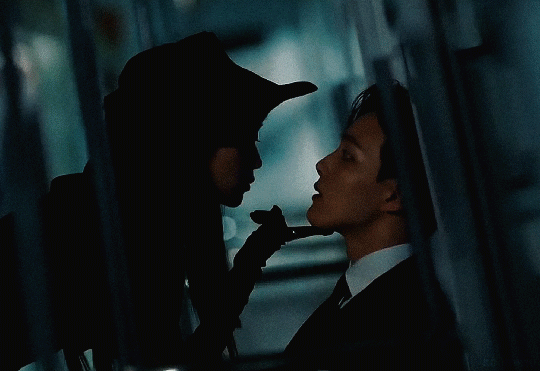
Extra-ordinary You
While none of the main characters in the drama celebrate any birthdays (that I remember), the male lead of the comic book they’re extras in does. Nam-jun has a big birthday bash where Dan-oh, Ha-ru and Do-hwa attempt to change the story.
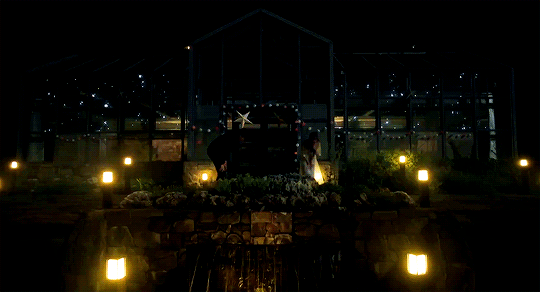
Business Proposal
Within the first episode or two of this drama, the female lead (Ha-ri) celebrates her birthday. Her parents don’t really do anything special for it and the guy she has had a long-time crush on gives her tickets to a concert for a group she was only interested in because of him, telling her to go with a guy she likes.
This sets up her for using the tickets for a date with Kang Tae-moo.
There's also an episode in which Ha-ri's best friend celebrates her birthday as well.
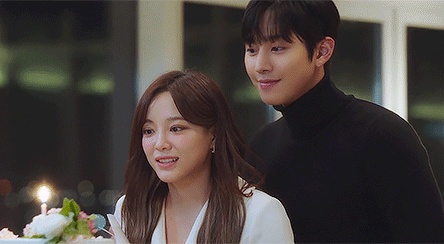
Tale of the Nine-Tailed
This is a drama that I recently started watching and actually haven’t finished watching yet, but the show starts off with one of the female lead's birthdays, a pivotal one as her family ends up in a car crash and her parents go missing. With this entry, we have found yet another character who can join the tragic birthday club lol
Reply 1997
Bit of a last minute addition to this list because I remembered the first male lead getting coupons for his birthday from his best friend/crush, which is a regular thing and he’s known for using them to great effect.

#kdramas#kdrama#kdrama recs#kdrama recommendations#birthday#tragic birthday club#doom at your service#hotel del luna#goblin the lonely and great god#guardian the lonely and great god#tale of the nine tailed#business proposal#extra ordinary you#extraordinary you#reply 1997
4 notes
·
View notes
Text
THE BOX IS NABOO
That’s it, I’m doing it, I’m writing that stupid meta I’ve had in the works for two and a half years, I’m sharing it with the world. I promised it for last Thursday, my poll was forever ago, but whatever! I’m writing that freaking thing.
(super duper long post, press j to skip)
Enter my rabbit hole.
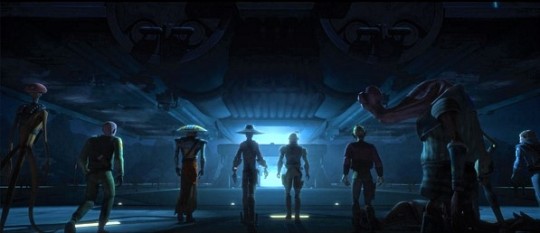
First thing to establish: the Box makes no sense whatsoever in-universe.
((EDIT: Something I forgot to mention. IRL, the premise of a giant murder cube and the aesthetic - wall patterns, light designs, etc - of the episode come from the 1997 horror movie Cube, (see the episode’s wookieepedia page). However, while the two are very closely linked visually, the Box does not follow the movie structurally or narratively, as you can verify by simply reading the movie’s summary.))
Recap of the context for the "Box" episode (s4e17): Palpatine is planning his own kidnapping. It was never meant to succeed, and while the plan would obviously benefit him (making the Jedi look bad, pushing Anakin closer to the Dark Side, making Republic citizens more afraid -> more docile, etc...) his actual goal is never explained, and it’s weird that he’d go to such extreme lengths for results so minimal that we’re never told what they are.
So Palpatine asks Dooku to kidnap him at the Festival of Lights on Naboo. Dooku hires Moralo Eval to design a giant box-thingy to test bounty hunters to hire the best of them to kidnap Palpatine. Moralo then gets arrested to alert the Republic that something is afoot, and hires Cad Bane to break him out. Obi-Wan - undercover to learn Moralo’s plan - goes with them. They evade capture and go to Serenno, and Bane and Obi-Wan have to pass the box-thingy test. The level of brainkarked logic here... Truly on par with Megamind, Gru and Heinz Doofenshmirtz.
Setting aside the insane plot holes and utterly nonsensical behavior of the villains, the Box itself is moronic from a plot perspective. It’s insanely complex, obviously incredibly expensive and would have taken months (more like years but it’s a short war) to make when it’s not even needed for the dastardly plot! Just hire some guys who have already proven themselves against Jedi! Throw cash at Bane and Embo and a few others! Maybe attack them with your saber and see how they do!
And after all that, Dooku still ends up trying to kidnap Palpatine on his own. I can’t even...
So why does the Box exist? Well, apart from being a nerdy callback to Cube, giving us a good thrill and being generally awesome to look at, it has actual narrative purpose within the SW universe.
The box is Naboo.
What the Box lacks in plot relevance, it makes up for with its heavily symbolic meaning. It very closely follows Obi-Wan and Qui-Gon’s experiences on Naboo - but only certain parts, which I’ll explain later.
We start with clean, sterile environments, SW’s favored way of showing villainy.
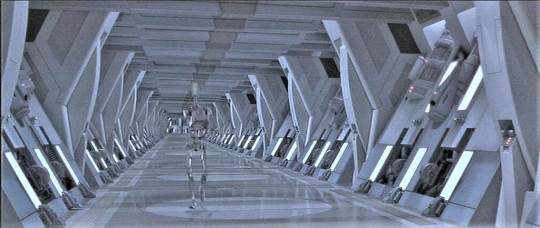

Then we have the protagonists locked in a room as dioxis, a poison gas, pours in.
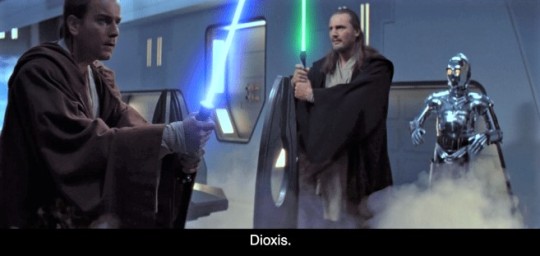
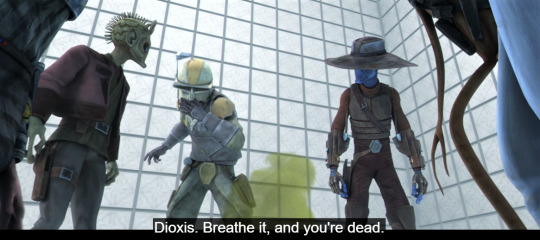
And then they escape... this way.
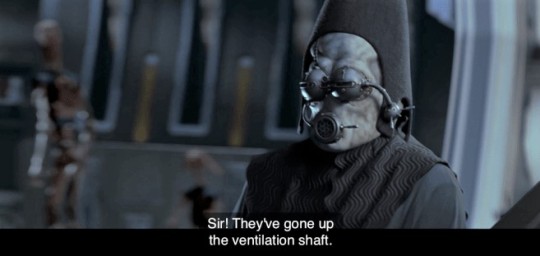

(Okay, here the shaft is down, not up. And it’s not a ventilation shaft per say, it’s the designed escape route. Same difference).
We then skip most of TPM (namely, Obi-Wan and Qui-Gon discovering the droid army, finding Padmé, leaving Naboo, landing on Tatooine, going to Coruscant, etc, etc) to come back to Naboo and go directly to the lightsabers and catwalks.
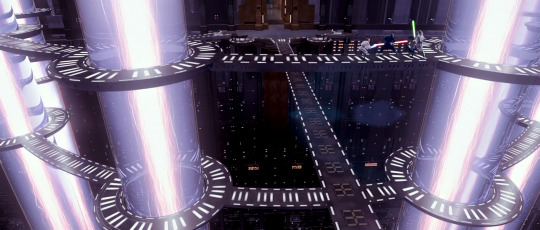

(Note: in both scenes, Obi-Wan has to propel himself from a catwalk.)
In TPM and TCW, the catwalks are immediately followed by ray shields
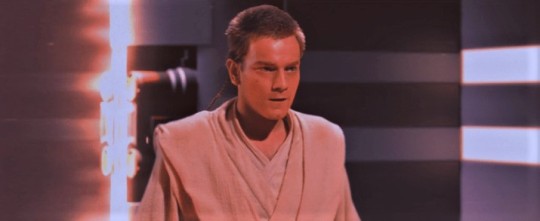
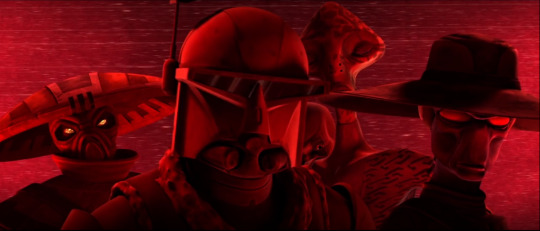
And we finally end with the last scenes. Now, they don’t look the same but they are structurally identical.
Obi-Wan is faced with a challenge unsuited for his abilities (facing Darth Maul // shooting three moving targets when he’s far more skilled with a blade than a blaster) on a narrow space above a melting pit/pit of fire.
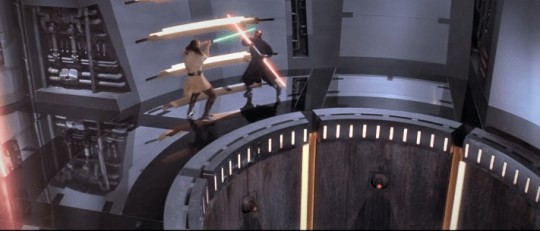
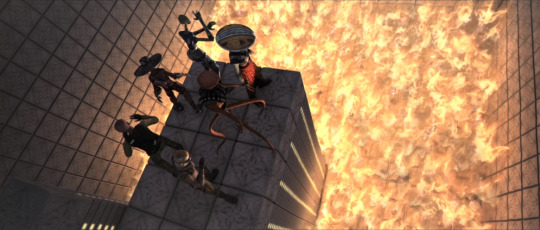
He first watches someone die failing to complete the task...

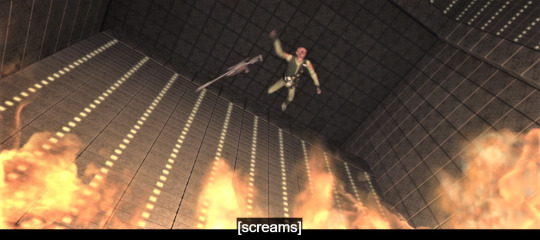
... and has to do it himself, faring much better than expected (holding his own against Maul // shooting all the targets easily).
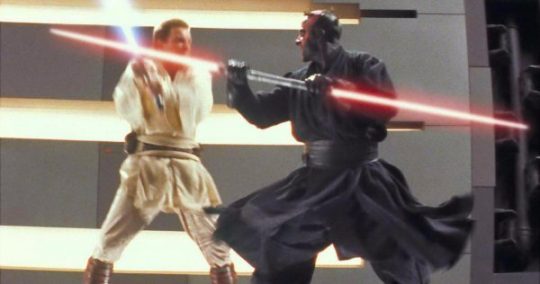
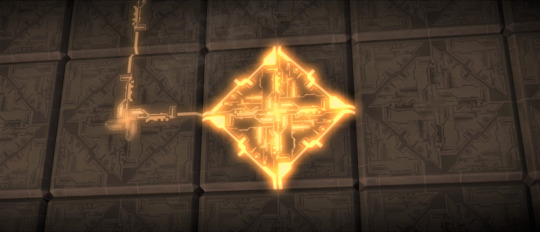
He then almost falls to his death and gets saved unexpectedly.
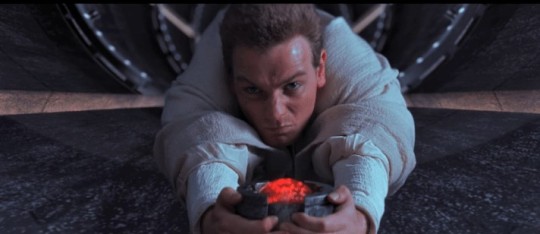
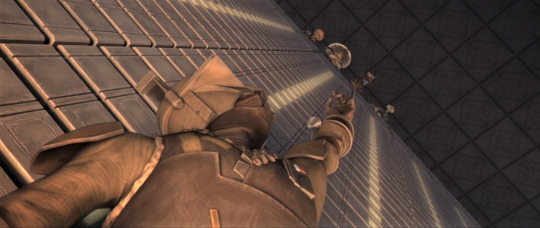
And then there’s the final showdown.
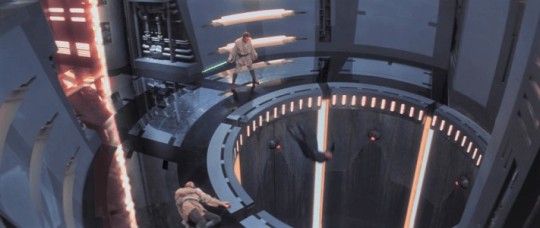
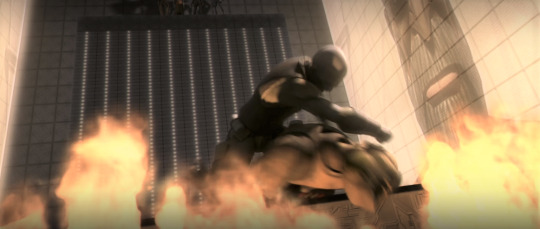
In both scenes, Obi-Wan is angry. And in TCW Dooku eggs him on, banking on his anger. (More on that later.) In both cases though, he centers himself and is able to overcome both his opponent and his own unbalance. But in TCW, he doesn’t go for the kill, because he doesn’t need to.
The Box, as a literal character-explorator ex-machina, thus shows us Obi-Wan’s growth.
In TPM, Obi-Wan follows Qui-Gon’s lead. In TCW, he is the leader. He identifies the gas, makes the plans. He doesn’t fall from catwalks anymore - he runs atop moving ones. He doesn’t stay stuck behind ray-shields, he finds the solution. (Btw, how did Moralo know what blood type Derrown the Exterminator was? There was a 50% chance of him dying - thus killing all of the bounty hunters. Was that an acceptable outcome? TCW I need answers!) He doesn’t slay his foes, because he’s become powerful enough, skilled enough and wise enough to survive (and win) without needing to kill.
He’s grown - and, even more interestingly, he’s also stayed the same. In the previous episodes, we see some of the dark aspects of Obi-Wan. How he - like all Force-wielders, all people - could lose himself if he stopped maintaining absolute control.

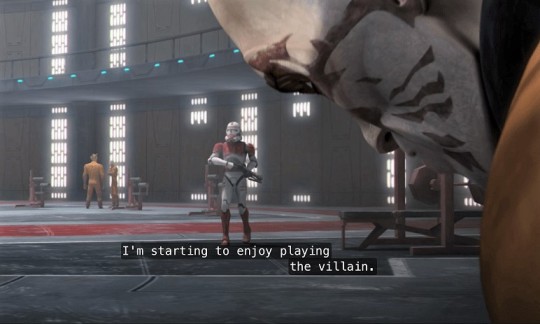

But in the Box, surrounded by the worst criminals of the Galaxy, the most ruthless, worthless people, he’s still kind and tries his best to keep them alive.


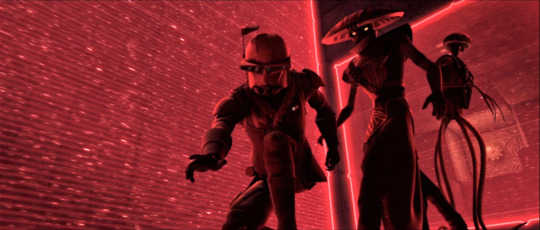
The Box is a reminder and a reassurance for the audience that Obi-Wan Kenobi is still there under Rako’s face. He hasn’t lost his compassion, his restrain. He’s still a Jedi. And he’s an awesome, badass one.
And now, for what it tells us about Dooku!
It’s much shorter, don’t worry. Basically, Dooku considers that the best way to pick “the best of the best” of the deadliest people in the Galaxy is making them go through what killed his Padawan. There, I’ve broken your hearts, you’re welcome.
More seriously, Dooku is a manipulative ass. It’s pretty clear that he knows Rako is Obi-Wan, or at the very least suspects it.
He has an interesting reaction upon learning Rako’s identity, he keeps praising him despite his usual distaste for low-lifes, he smirks secretively after Eval says “I’ll show you who’s weak” (not included there because it’s a close-up of Dooku’s lips and no one wants to see that) and he tells Rako he’s very disappointed when he doesn’t finish off Eval.
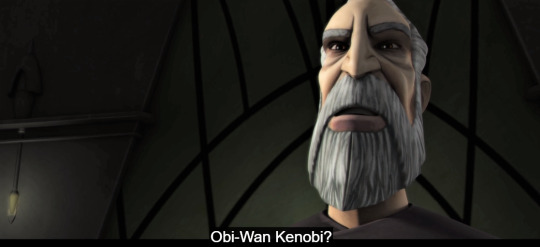
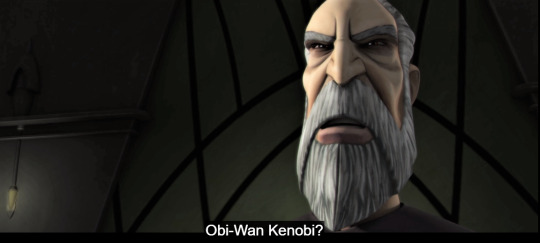
[Later]
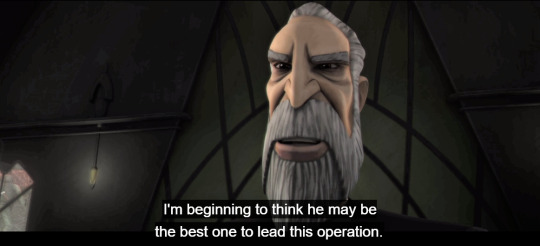
(Look at this smug asshole - I can’t. YOUR GRANDSON IS THE BEST, WE KNOW, STOP ACTIVELY RUINING HIS LIFE ALREADY.)
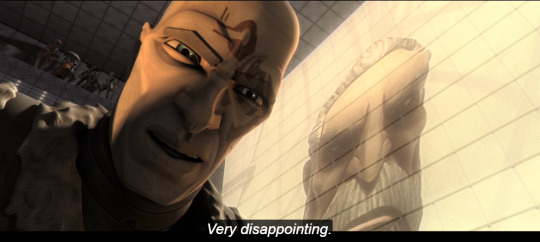
(Dooku... why...)
Now obviously Dooku couldn’t have made the Box specifically for Obi-Wan, because it would have to have been designed months before the Council ever decided to send Obi-Wan undercover, but he has no qualms trying to use it to push Obi-Wan to the Dark Side. Ffs Dooku, making your spiritual grandson relive one of the most traumatic events of his life on the off chance that he’ll join you (and desecrate his Master’s memory in doing so) is not okay!
Final tidbits of analysis: I mentioned that not all of TPM is mirrored in the Box. What’s omitted is the droids (even though Obi-Wan and Qui-Gon fight B1′s and droidekas between the dioxis and the ventilation shafts) and anything pertaining to Sidious (all the political stuff on Coruscant). You’ll also note that the fake lightsabers are orange.
=> The Box distances itself from anything that connects Dooku to Naboo. Red lightsabers are the trademark of the Sith, so they’re not used. The bounty hunters will be facing Jedi, so logically the fake sabers should be green or blue - and yet they’re orange, the color closest to red without being red. It fits with Dooku’s special brand of dishonesty - he always tells bits of the real story but twists them just enough to absolve himself of any fault and to justify his choices.
(”We can destroy the Sith” -> could maybe destroy Sidious with Obi-Wan, but fails to mention he’s a Sith Lord himself; “the Viceroy came to me for help, that’s why I’m attacking the Republic” -> political idealism is a small part of it, but fails to mention he’s Sidious’ underling and is playing the Viceroy like a fiddle; “Qui-Gon would have joined me” -> maybe, still fails to mention he’s working for the man who ordered Qui-Gon’s death; “I told you everything you needed to know” -> debatable, never said that Palps was Sidious; “Sifo-Dyas understood, that’s why he helped me” -> partly true, doesn’t admit to killing Sifo-Dyas right after getting his help)
So we have a twisted version of Naboo, droid-free (as droids are now irrevocably associated with Dooku, even if that wasn’t the case in TPM) and with sabers that aren’t quite red. Keep in mind that Dooku had already fallen by TPM. (We know this because he killed Sifo-Dyas and created the Clone Army - part of Sidious’ plan - when Valorum was still Chancellor, as per the episode The Lost One.) That means Dooku was (in)directly complicit in Qui-Gon’s death. And the Box doesn’t (=refuses to?) acknowledge that.
(Also omitted in the Box are the Gungans and Tatooine. It makes sense, because Dooku probably wouldn’t have the full details regarding those parts of Qui-Gon and Obi-Wan’s missio as they weren’t as public, and would see them as irrelevant if he did. He utterly despises Anakin, and Gungans are the type of people he always dismisses out of hand).
Anyway, that’s my two cents about the Box. To quote Lucas...
“It’s like poetry. It rhymes.”
Thanks to @lethebantroubadour @impossiblybluebox @nonbinarywithaknife @ytoz and @kaitie85386 for voting for this one. Next up is a compilation of the Jedi being casually tactile with each other (because they’re a warm and affectionate culture, dammit).
Also thanks to @laciefuyu for giving me gifs I ended up not using ^^; you rock anyway!
#meta#my meta#the box#deception arc#rako hardeen#rako hardeen arc#naboo#obi-wan kenobi#count dooku#cad bane#moralo eval#darth sidious
1K notes
·
View notes
Text
Let’s Talk: Jimin’s & Tae’s confessions (RUN Episode 141)
by Admin 1
Originally, I planned on writing a summary or vmin cut of the RUN episode but then I transcribed Jimin’s and Tae’s confessions and it got me thinking, and now here we are. Instead of a summary here are some of my musings and thoughts about their confessions and how they are right in line with things they’ve said in the past, and even quite recently, as well as how it fits with something Namjoon said in 2020 about them as well. I hope this will at least be somewhat interesting.
So, first, let’s look at Jimin’s confession, since this is longer and was first in the episode:
Jimin’s Confession
Jimin: Sometimes I am blunt. I’m like that at times.
Na PD: Taehyung, has Jimin ever said anything bluntly to you?
Tae: Nowadays, he's really putting in effort to fix that to the point where it rarely happens anymore. Jimin tends to be very hard on himself, which also broke our hearts to see.
Na PD: So, he gets stressed from himself, then gets mad at himself...
Tae: Then gets mad at himself.
Na PD: ...and then he blurts remarks.
(here it was a bit unclear (for me at least) which of the two said which line so I’m sorry if I mixed them up)
Jimin: It’s something I want to be forgiven for.
Tae: But Jiminie being blunt and me being blunt is completely different. Jimin has a kind hearted nature on the regular.
Na PD: Right.
Jimin: Are you usually not like that?
Tae: I’m, well...
The other members stop Tae, since it’s not time for his confession, and instead the question is posed by JK if they forgive Jimin to which everyone says yes.
Tae: You’re innately kind at heart. stretches out hand for handshake.
Jimin: Thank you. Jimin thinks (?) Tae might be going for a fist bump since he gives him his fist instead, which Tae still takes and shakes.
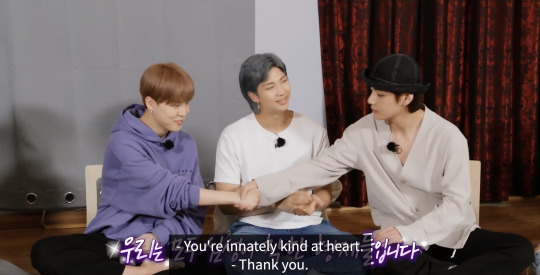
The first thing about this that caught my attention, as well as one of our anons, was the fact that instead of choosing literally any of the other members, Na PD turned to Tae and asked him to verify if something like that (as in Jimin being blunt) ever happened toward him. You could say we’re thinking too much here, interpreting too much into it, and yet it doesn’t change the fact that he chose to ask Tae. Of course it could be because he said at the start of the program that he feels closest to Tae since he heard about him from two of his Wooga squad friends, but it might’ve just as well been because he watched the members for a while already at that point (since they’d already been filming a few hours) and perhaps he did notice how Tae and Jimin naturally gravitate toward each other, have this special bond? Other people who worked with them in the past noticed it, so why wouldn’t he?
There’s actually moment where Jimin turns and says Taehyungie like he wants to ask him something or say something to him which isn’t in the subs and the members don’t notice it either so Jimin never got to actually say whatever he wanted to say. Also, we’ve all seen how Tae and Jimin behaved during the game in the previous episode, how happy, smiley and giggly they were while being silly together.
Then the actual confession itself, Jimin saying that he can be blunt at times, toward others but also especially toward himself. We’ve heard many times from Jimin about how much of a perfectionist he is, how he can get mad at himself for mistakes, how he sometimes speaks without thinking which can end up a bit mean/blunt, and now he’d like to be forgiven for it.
This actually reminded me of something he said to Tae before:
FESTA 2020 from 42:56 min onward (context - the question was: have you felt disappointed in or sorry to the member to your right?):
Jimin: For Taehyung I should say if I compare those two feelings to him I was more hurt than sorry. Over time, it was reversed. Now I don’t feel slighted. I’m more sorry about things. Back then we were buddies so we had a lot of disagreements or didn’t admit that we were wrong. So I felt disappointed about little things. Now he listens to me well so I feel sorry that I talked to him harshly and every little thing.
The last line especially sticks out to me. I know there’s some language nuance here that got lost in translation which wisha mentioned when the FESTA 2020 video was posted (but is now gone since her twt was suspended), and yet it doesn’t change that fact that it fits with Jimin’s confession, how he was harsh to Tae in the past but now feels sorry for it, and with what Tae said, that Jimin is now making an effort to fix that behavior, to not be so blunt/harsh anymore.
It’s so interesting to me to see these mentions of what could be seen as character flaws over the years, things that make them inherently human. Also it fits with what we know about the evolution of vmin, how they used to have disagreements, have issues with proper communication but over time worked on it, got better at it to the point where they can now understand each other by just looking into each other’s eyes, and Tae’s words about Jimin, how he’s an angel, the warmest person he ever met, and now how he has a kind hearted nature, therefore the bluntness is not taking away from it in any way.
There was also something about this in Jimin’s solo RollingStone interview which caught my attention:
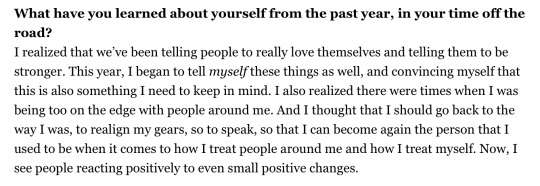
(btw, if you haven’t yet, I highly recommend reading the main and solo RollingStone interviews because they are really, really good!)
Taehyung’s confession
Tae: Compared to the other members, I’m very lazy. Once I’ve set my mind on something, to get that into action, it takes me up to 2 months. I’m start working out, then quit. I’ve quit projects midway too. I’m the type where if I’m not feeling it, I don’t do it. There are times when I feel sorry to the members.
Someone (I can’t pinpoint the voice): How would be summarize this?
Jimin: You’d usually call this as “irresponsible”. He lacks responsibility,
Tae: I’m still an amateur.
Na PD: “I lack responsibility and am lazy”. Is that how we can understand it?
Tae: Yes.
Jimin: To be honest, we don’t think it’s to that extent, but if that’s what he feels... we forgive him.
Something I love about what Jimin said (in far fewer words than I will use because you know me, I can’t keep myself short) is that he essentially did two things at once, being: he assured Tae (and the viewers) that him and the members think differently, don’t see it as severely as Tae does himself, and then he also acknowledged the validity of Tae’s words, that even if Jimin doesn’t agree with him, Jimin knows that those feelings are still valid, that that’s what Tae feels and that, at the end of the day, even if the members don’t agree, they can’t change Tae’s mind, can’t force him into seeing things differently. The only person who can do that is Tae himself, and that’s okay. Jimin and the other members will still quietly support and reassure him when needed until he’ll “fix” this weakness, if that is something he wants to do.
This really shows how in tune with Tae Jimin is, but also how emotionally intelligent he is. Beautiful. Also, notice how Jimin said that without being asked to do so, which will come into play again a little later in this post and why I point it out specifically again.
Listening (or rather reading along) as Tae said that, it reminded me of something he said a few months ago:
Taehyung BE-hind Story Interview from 5:49 min onward:
Q: How do you cope when it’s hard to work/with these situations?
Tae: I’m very true to my emotions so uh...if I can’t write the songs or can’t come up with a title I just don’t. Like now!
Yoongi: That’s actually the best way.
Tae: I just don’t write it like how I’m doing it now, and I don’t want to be pressured to create something against my will.
Yoongi: It’s not like you have to finish a song within a day or two?
Tae: Right! So I’ve been taking some rest for about four months now. Now that I’m resting for four months...
Yoongi: Wasn’t your mixtape supposed to be out last year?
Tae: The mixtape that was supposed to happen last year was postponed. I should be in a state full of emotions right now, but I haven’t reached it yet. It’s like...my first mixtape so I want to feel that satisfaction when I release it whenever that time will be.
Yoongi: That’s why you have to finish the whole thing while you’re at it...
Tae: Yes.
Yoongi: ...or else it takes too long to finish it. So, you have to finish it within that period.
Tae: Right.
Yoongi: I’m guessing you might’ve missed the time.
The thing though is that what Tae said, that if he doesn’t feel it, he won’t do it/finish it, that just shows how much of an artist he is, how much his art truly matters to him, and how important it is to him that his art, in this case his music, turns out just the way he wants it to or else he won’t finish it or release it. And while Tae might call this “irresponsible”, I don’t think it’s that in this case, or that it’s a sign of laziness either, though just like Jimin, I don’t want to invalidate his feelings either. All I want to bring across is how in the context of his music, this isn’t a weakness or flaw, even if it might seem like it, especially in their line of work with deadlines, schedules and plans made weeks and months in advance where, usually, you can’t just take a four month break.
So, in that regard, I can understand how it can feel like a flaw to him, make him feel guilty about it and sorry to the members who in this case might rely on him to get something done on time and he might not do it, or not without forcing himself to do it or being dissatisfied, you know what I mean?
Earlier today Tae was on weverse and answered a few questions about his mixtape (though I have a feeling it really is time for ARMY to stop asking him about it and just let him breath) where he said that even though he got a song from someone and made ten himself, even with that break he took according to his BE interview, the songs just aren’t what he wanted them to be and thus he decided to start again.
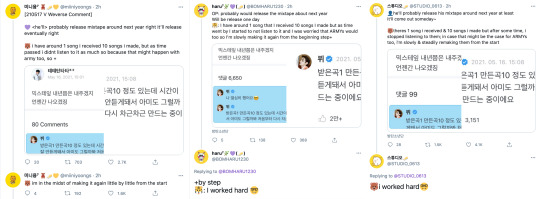
Some could say it’s again a case of him being irresponsible the way he characterized it during the RUN episode, that even though he said last year he was almost done and would release it soon it ended up being postponed and now he started over again, but once again I think it just shows how very important his music is to him, and therefore I’d actually call it a strength. It shows how valuable his artistic expression is to him, to create music the way he wants to, at his own pace, and only release it once he feels it’s right.
One more thing, just like I said in the intro of this post, Jimin and Tae jumping in to assure the other, reminded me of something Namjoon said during his Map of the Soul : 7 vlive last year:
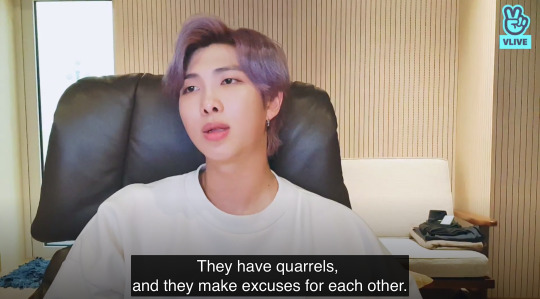
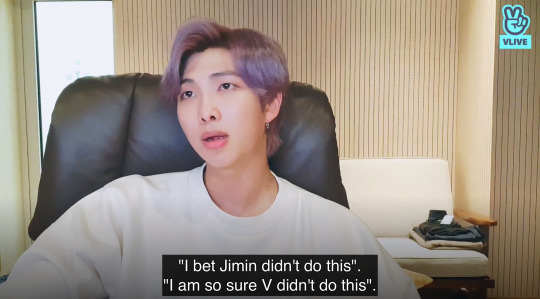
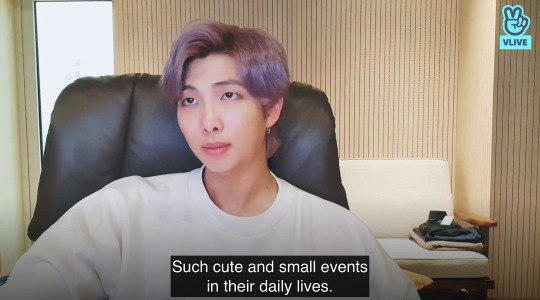
The context is a little different, but I think it’s still valid here as well, how Tae and Jimin made excuses for each other, how Tae immediately softened how harsh Jimin’s own words about himself might come across, assured both us and Jimin that really he has a kind heart despite this weakness, and then also Jimin by saying that things aren’t as bad as Tae makes them seem either. It’s interesting to really see something play out in a manner similar to what another member said about them based on having been with Jimin and Tae for the last nearly ten years.
Whoever claims that BTS just play out concepts or “plots” and characters given to them by the company really should just take a seat and stop. I mean, sure they all have a sort of persona they embody in front of the camera, at least to a certain degree, they’ve spoken about that numerous times, but they are still humans with flaws and their own dynamics between each other away from the cameras which, logically, also come across on camera as well, not always but enough for us to pick up on it. And in this case, with these confessions during RUN, we saw something that we previously only really heard about happen right in front of us proving (not that they have to prove anything to us, of course, we should simply trust them and what they tell us) that it really is that way.
Here’s the anon I mentioned earlier:
From anon: It might just be me lol but I think rather than Jimin forgetting he's being filmed for a show (with all those members of staff as onlookers as well) and blowing a kiss at Tae / blowing on Tae's chest, he probably just noticed a tiny bit of lint or fluff on Tae's cardigan or mic and decided to blow it off... Of course, if that was the case, that still reveals their high level of intimacy and the fact that even when interacting infront of strangers they seem to be unable to stop showing exactly how tuned into each other they are... I don't think it's a coincidence that Na PD chose to ask Tae, of all the members, to verify Jimin's statement about his flaw. He was probably observing them all day and noticed how particularly close they were, even amongst all the extremely close members.
94 notes
·
View notes
Text
Anime I Watched This Fall
My first semester of college is officially over and the December holidays are upon us! I hoped to make one of these posts sooner, but I have been incredibly busy with schoolwork. Now that things have slowed down, let’s take sometime to reflect on things I’ve watched.
These anime are listed in chronological order and encompass everything I’ve watched from 9/1/2020 - 12/15/2020
Like always, they will be rated on a 1-10 scale; 1 meaning complete garbage, 10 meaning masterpiece. I will offer my thoughts on what I did/didn’t like about each show!
1. The God of High School - 6/10

Despite the stellar animation from MAPPA and my high expectations, I was really disappointed by how this series was treated. Most of the story’s crucial elements were handled poorly. I finished this series feeling more confused about the plot than when I first began. The power system is really cool, but poorly explained. More time should have been spent on exposition and world building for this series, instead the fights were given the most screen time.
2. Doukyuusei - 7/10
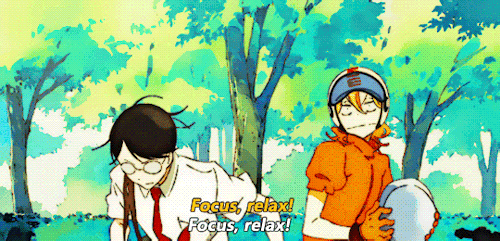
I really liked the style of Doukyuusei. Granted, this was another movie I chose to watch primarily because of the hype surrounding it. The dynamic between Kusakabe and Sajou is an interesting one, and I also enjoy how the movies different acts were separated by the seasons. However, there's nothing that really sets Doukyuusei apart from other romance movies, its a little generic. Still, I enjoyed it nonetheless.
3. Re:Zero kara Hajimeru Isekai Seikatsu 2nd Season - 8/10
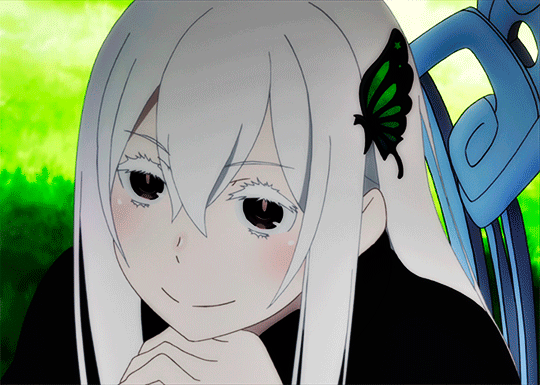
My opinions on Re:Zero’s second season are biased. This was, by far, the sequel I was most hyped for during the summer/fall anime season. I was so happy to see the story’s continuation and I’m looking forward to the season’s second part coming sometime in January. Re:Zero is one of my all time favorite series because of the way it handles it characters and power dynamics. I also really enjoy the show’s psychological aspects. If you haven’t already, give Re:Zero a try!
4. Saint☆Oniisan (Movie + OVA) - 8/10

This was a wonderful comedy. I wasn’t sure how the subject of Jesus and Buddha living together would be tackled, but it was handled wonderfully. I was laughing for pretty much the entire movie. I love the art style and little references to both Buddhism and Christianity, plus the incorporation of Japanese culture. Saint Oniisan is a bright comedy, with two eccentric main characters. If you like a show that doesn’t take itself too seriously, and need a good laugh, I can’t recommend this more.
5. Clannad: After Story - 10/10

Never, while watching anime, did I cry as much as I did while watching Clannad: After Story. I didn’t realize how much I related to Okazaki until I saw him grow up in After Story. I was left sobbing, especially after episode 18. I still, to this day, cannot listen to the Dango song without tearing up. The original Clannad is nothing special, but the continuation of its story its something heartfelt, emotional, and down-to-earth. I love Kyoto Animation with all my heart, and Clannad made me appreciate everything the studio has done just a little bit more. Thank you Clannad, for reminding me about the kind of person I strive to be.
6. Nakitai Watashi wa Neko wo Kaburu - 5.5/10

The art in A Whisker Away was beautiful. The story itself, however, is nothing too enjoyable. I found it difficult to like our protagonist or her love interest. Nothing about this movie is inherently memorable. The emotional climax came far too early which made the second half of the film seem long and drawn out. All in all, the movie has a wonderful concept, I just believe it could have been so much more emotional than it was. When I watch a move, I like to empathize with the characters. It’s difficult to do when the characters aren’t given the proper exposition to be empathized with.
7. Shikioriori - 6/10

This is less of a movie and more of a collection of short stories. Flavors of Youth is something you shouldn’t watch on an empty stomach, all of the food looks incredible. The same cannot beside for the rest of this feature. The stories themselves seems heavily clichéd. Much like A Whisker Away, the initial premise is intriguing, but the execution results in something that comes across as trying too hard and carries no emotional weight with the viewer. If you plan on watching, pay more attention to the artwork and animation than the actual plot. You won’t be missing anything.
8. Vinland Saga - 7/10

Vinland Saga helped me get out of the rut that Clannad: After Story. Not only does this show have a great story, its action packed with lots of interesting fights. I especially enjoyed all the Nordic history embedded within the show. Its really unlike any of the other historical anime I’ve watched. I will say, it’s gory. But, compared to all the other things I watched this time around, I finished this series the quickest. Its good, its graphic, its fast paced!
9. Mononoke Hime - 7/10
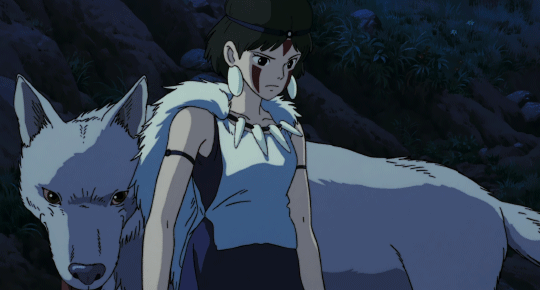
It’s ironic considering how much anime I’ve watched that I have yet to watch all of the most classic Studio Ghibli films. Princess Mononoke is grittier than most other Ghibli films I’ve seen, but it’s message is positive and its characters are wonderful. I can’t really speak ill towards classics like these. I guess maybe my one complaint is that this movie could’ve been a faster pace. Other than that... I really enjoyed everything Princess Mononoke offered! I understand why it’s so popular.
10. Howl no Ugoku Shiro - 8.5/10

Can you believe it took me this long to finally watch Howl’s Moving Castle? Me neither!! This movie is so endearingly beautiful. I loved every second of it, from the characters to the soundtrack. So many iconic things come from just this one movie. I would like to take this time to thank my best friend for reminding me that Studio Ghibli films are wonderful! Thank you for watching this with me, I loved it! All in all, I regret not watching this sooner!
11. Toradora! - 6.5/10
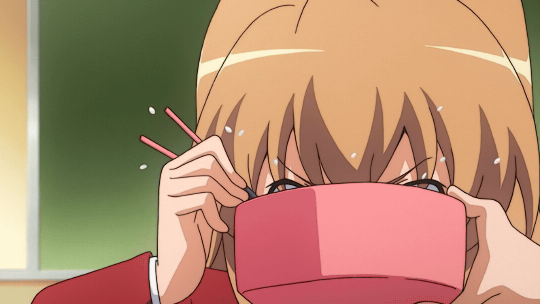
Toradora took me a while to finish, just because I lost interest about halfway through. But, I powered through it, and ended up really enjoying the show! I’m not the biggest fan of the ending, but that’s just a personal preference. Somehow, this show also made me cry? I’m not entirely sure why because Toradora! is probably the thing farthest from sad. Apart from the show’s dull slice of life moments, it was super cute! A much needed light-hearted romance.
12. New Initial D Movie: Legend 1 - 5/10

Full disclosure, this is the only thing related to Initial D that I’ve ever watched. My band and I watched this expecting to hear some of that iconic Initial D music, itself all we got was a mildly confusing story about different types of cars. It was cliché and frankly a little boring. Although, I am still considering watching the original Initial D just so I can hear the music in the way it was original intended. I’ve got no other opinions on this movie. It’s best not to watch these movies without the context from the rest of the franchise.
13. Uchuu Patrol Luluco - 7.5/10

I didn’t really understand why people enjoy studio Trigger so much until I watched Space Patrol Luluco. I loved all the fun references to other studio Trigger works. I loved the humor, and I loved all the bright colors. The animation was extremely high energy, and the art style fits the show’s premise. Each episode was only 12 minutes long so it was a super quick binge. If you’re looking for something quick, light-hearted and comical, this is the perfect show to watch.
14. Orange - 7/10
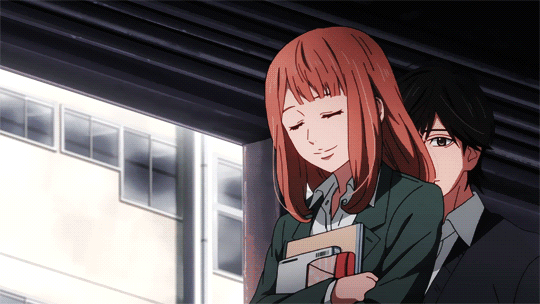
I owe a big thanks to a tumblr mutual for recommending this show to me! This holds the honor of making me cry by episode 3! I honestly did not expect the subject matter of this show to be as dark as it was. Usually when I see the genre ‘shoujo’ I do not associate it with a love story like that of Orange. The heavy subject matter made it a little too close to home for me, but I still really enjoyed this series. It reminds me off all the good times I had with my friends in high school, and of all the regrets I carry with myself to this day.
15. 3-gatsu no Lion - 7.5/10

March Comes in Like a Lion is another show that was a bit of a slow burn for me. Each episode left me feeling emotionally drained, so I had to take a lot of breaks while I was working on watching this series. Shaft, the studio behind this anime, holds a special place in my heart because I loved their work on the Monogatari Series. March Comes in Like a Lion is a little different. It’s driving force it is characters, and it was cathartic to watch our main character transform through the entire duration of the first season. I know the show’s second season is much better, so I’ll be starting that soon!
16. Yojouhan Shinwa Taikei - 8/10
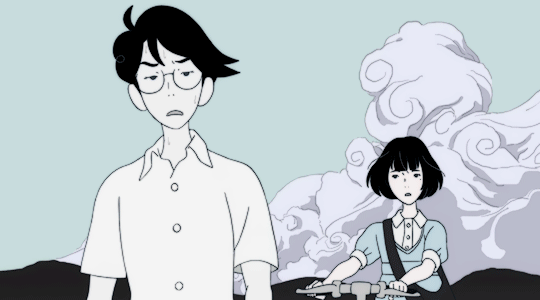
I loved how artsy and smart The Tatami Galaxy is, but honestly I couldn’t watch too much at once cause it would hurt my head. I also couldn’t watch this show while I was tired because the speaking rate is much faster than typical anime. The Tatami Galaxy is so unique for its medium. I loved the different time loops and the crazy animation. The characters were fascinating. The dialogue, although very fast, it also fantastic. There’s an element of humor to this unique story telling, and I enjoyed ever minute of it!
Currently Watching:
Hunter x Hunter - 6.5/10 (As of Episode 30)

I pride myself in having watched a lot of shounen anime, but I was reluctant to start Hunter x Hunter for years because I thought I would find it boring. I was oh so very wrong. Considering great shows like Naruto and Fairy Tail that fall under the same category, I expected Hunter x Hunter to be subpar in comparison. It gets a low score for two reasons. One, the power system was introduced a little too late and now I’m wondering if all the fights post episode 30 will involved nen in some way, shape, or form. Two, its still on hiatus.
Two Cursed Additions For This List
Please to do not let these be representative of my anime taste.
1. Yarichin☆B*tch-bu - 4/10
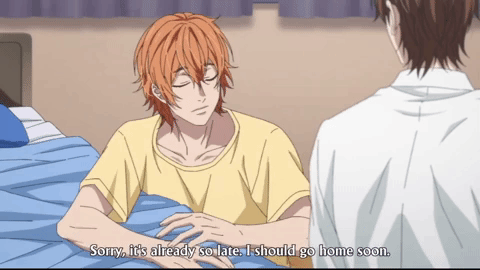
I am a CLOWN for not knowing this was 18+. The only reason I watched this was to see why everyone was talking about the pink-haired boy with the glasses and tongue piecing. I know why now, and I regret it. This was a massive mistake on my part. But hey, at the least the art and ending song kinda slap?
2. Euphoria (Dropped After 1 Episode) - 2/10
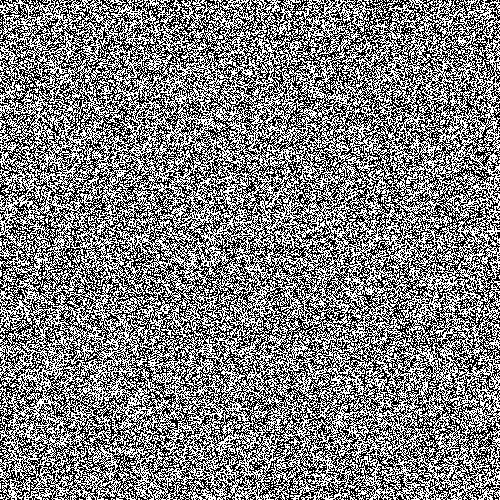
If you know what I’m talking about when I say Euphoria, I am so sorry. And no, I am not talking about the HBO series. Seriously, don’t google this. Don’t watch this. Don’t interact with anything related to this. You’re probably wondering, “Then why did you watch it?” I did not watch this willingly. You see, I have a very bad habit of starting anime and then taking months to finish them. I made an ultimatum with a friend, lost, and then was forced to watch this a punishment. Not a fun experience. I’m very glad there are no GIFs of this on tumblr...
#the god of high school#goh#god of high school#anime recommendation#doukyuusei#classmates#rezero#re:zero#rezero season 2#saint oniisan#saint young men#Clannad Afterstory#clannad#nakitai watashi wa neko wo kaburu#a whisker away#shikioriori#flavors of youth#vinland saga#mononoke hime#princess mononoke#Studio Mappa#studio ghibli#howl no ugoku shiro#howls moving castle#toradora#initial d#uchuu patrol luluco#space patrol luluco#orange#orange anime
276 notes
·
View notes
Text
My thoughts on 03 and CoS
When I started watching 03, I came in with really high expectations. And I loved it!! Especially the first half - I loved the melancholy tone, the way they fleshed out the FMA world. That being said I have Opinions™️ which also includes some criticisms, as usual. Hearing things about 03 out of context definitely colored my expectations and perception of it. This is partly about the writing of 03, but partly about my own experience watching it.
I’ve been meaning to write and post this for about a month, but only got around to it just now, lol. Spoilers ahead if you haven’t seen it.
What I liked
- The way it took the stuff from the manga and made a completely different story was AMAZING. Far after the storyline diverged, seeing influences from the mangahood storyline and how they were taken in a completely different direction was super cool.
- The tone!! 03 felt much more personal, much more melancholic. We really get to see how traumatic events like the fight with Barry the Chopper effect Edward, and we see that he’s really just a child. A child in the military. I know “03 shows Ed as a child soldier” has been talked about a lot and that aspect of 03 really lived up to what I heard about.
- I loved the fillers!! The adaptations of the bonus comics were delightful to watch and really fleshed out the Mustang squad in a way that Brotherhood didn’t. Roy quoting the Art of War during the Fullmetal vs Flame episode was super cool, ties well with my Xingese Roy headcanons, and I’ll probably write a whole meta on that later.
- Even though I have some beef with the ending, which I’ll get to in a bit, it felt really special to me, personally, to see the characters hopeful and happy even after going through so much loss. I really like the message that sometimes, we do fail. Sometimes, what we’re chasing after is never meant to be ours. But we can learn to get up, and keep going. We can let go of that lost heaven.
What I didn’t
- I heard the line “My sympathy will not be spent on soldiers” out of context. I guess I expected it to be some badass line from Scar about why his anger towards the Amestrian state is valid and not something he needs to apologize for.
- Instead, that line was delivered by Scar right before committing an atrocity - sacrificing a huge number of soldiers for a philosopher’s stone, and placing a huge burden on a 14 year old boy by making Al’s body that stone without his permission. And Scar, after all he’s been through, didn’t get a happy ending. It wasn’t some badass thing, it was painted as tragic. I was really disappointed about where that line ended up and I’ll probably write a whole separate post about the lost potential of that line.
- Ed’s admitting that he has racial bias didn’t live up to my expectations. One of my biggest criticisms of mangahood has been the narrative’s stance towards race: “I think we should ignore race and treat each other as equals!” A common response I got was, “03 doesn’t do that! They actually have Ed admit that he has racial bias!”
- When that scene actually happened, I was thinking, “is that it? Is there more?” And yes, much of that disappointment likely came from me setting way-too-high expectations for the race themes of a shonen anime from 2003. It was such a short moment and didn’t feel as climactic or important as it should have been.
- Roy Mustang. Roy Mustang. The narrative expects us to sympathize with him, to like him, but I found it very hard. In mangahood, Roy’s goal to become Fuhrer and change the country for the better, to help the Ishvalans and make sure that a genocide like that never happens again, is a huge part of the show. In 03, it’s hinted at. Roy talks about becoming Fuhrer in the miniskirt episode, and it’s hinted that he has good intentions and wants to help the Ishvalans. But it’s not considered important.
- And then he completely throws that away.
- Reading things from 03 out of context, I somehow got the impression that Roy was going to quit the military after realizing that he doesn’t want to work within the system anymore. And I was thinking “omg that’s so cool! 03 actually has Roy renounce his ambitions and leave the military, because it’s the best way to help the Ishvalans!”
- Nope. That coup he stages? It’s not out of anger at how the Amestrian state treats its people. It’s not to avenge Ishval. It’s to avenge Maes Hughes, Roy’s friend.
- Having Roy stay in the military, but give up his rank, almost feels like a halfway point between two good ideas: Climbing the ranks to change the country, or leaving because he doesn't want to uphold a corrupt system. Maybe they could've made it work, but I wish they grappled with the implications of that more.
- adklsfaksldfhjks I’m very angry about this and this probably also needs its own post.
- Things in the second half of the show just didn’t feel as fleshed out. In Mangahood we got some time to grapple with the fact that Amestris was created by Father to be sacrificed, to grapple with the implications of that. In 03, that revelation came so close to the end that we just didn’t have time. I was left with so many QUESTIONS about the worldbuilding and parts of the plot, especially after CoS, and they didn’t get answered. I feel like a lot of my problems with 03 would be solved if they added a few episodes. It’d give them time to slow down to add more details, or even just give us an episode or three of Backstory.
all my QUESTIONS:
- Details on Dante and Hohenheim controlling humanity behind the scenes?? They just. tell us that they destroyed entire civilizations like Xerxes.
- Where do Gluttony, Greed, etc come from? If they were created simply to serve Dante, does that mean they were all created after Hohenheim left her?
- Why was Greed imprisoned? Why does he refer to the other homunculi as his sworn enemies?
- Lust is described as the “third Lust.” Who were the other Lusts? Is each sin a position in Dante’s squad, a role that can be filled after the one holding it dies?
- Envy is 300 years old. What the hell were they doing for all that time? Much of their character is based off of resentment of Hohenheim for leaving them and Dante, but that happened extremely recently.
- Hohenheim mentions that alchemy is fueled by people’s deaths in the parallel world?? And it’s NEVER mentioned again??
- How does the portal work? Ed landed in 1910s London, then 1920s Germany. But the times match up in CoS, with the 2 year gap and everything.
- I didn’t understand where the opening flashback about the uranium bomb comes from. It’s implied that it happened in the time gap between Ed joining the military and the Liore arc, but iirc the guy with the bomb came from the other world. How did he get there? How come Ed and Al spend a couple years knowing that a parallel world exists but it’s never brought up?
- How did Ed meet Alfons and get involved in the rocket stuff?
- From one of the guys in the Thule society: “but Hohenheim’s sons are from Shamballa.” HOW DOES HE KNOW THAT?
aklsfhsdj that was long. Stay tuned for some more metas about 03, because your girl has Opinions.
#fma 03#fullmetal alchemist#fma meta#conqueror of shamballa#edward elric#roy mustang#scar fma#aure speaks
61 notes
·
View notes
Text
Death in Star Wars, and How Ben Solo Was Shafted: A Mini Meta
Something has been bothering me about Ben’s death in The Rise of Skywalker. While I’m upset that he died, I echo the sentiments of other fans that just as offensive was the way that he died and how his death was treated in the context of the film. It bothered me because death has always been a part of Star Wars, but usually handled much better.
And so this meta was born.
I will be doing a brief analysis of significant character deaths from the Star Wars movies. I don’t want to touch on all of them because there are simply too many, so I’ll focus on the ones that were either major characters (i.e. trio billing or main villain) or narratively important (i.e. Shmi Skywalker).
This list will be approached chronologically within the Star Wars universe, beginning with:
Qui-Gon Jinn; portrayed by Liam Neeson
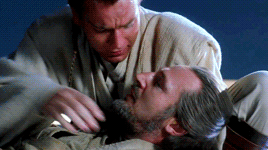
Personal feelings: I cried like a baby. Qui-gon holds a special place in my heart. His death was both epic and sombre. It hurt to watch other main cast celebrating their victory after defeating their respective challenges and then cut to Obi-wan cradling his master’s head in his lap, crying.
Mode of death: Killed by Darth Maul at the end of The Phantom Menace. His actual death takes a few minutes of screen time, an outburst/scream from another main character (Obi-wan). He has last words to say to the person he has the closest on screen relationship with.
Aftermath: Held by a visibly devastated Obi-wan while he died. Sombre funeral pyre. Death discussed on screen by the council and Obi-wan.
Narrative purpose: To enable Anakin’s training under Obi-wan, which is pivotal to the overall arc of this trilogy. To provide a tangible loss and character growth for Obi-wan, who failed to save his master from a Sith--later mirrored by Obi-wan’s inability to save Anakin from becoming a Sith in Episode III, thereby providing a narrative ‘tail-end’ to Obi-wan’s journey in the trilogy. To cement the master/apprentice relationship as loving, emotional, familial, which then adds narrative depth to the bond between Obi-wan and Anakin. To introduce a cohesive theme of death, failure, and loss at the hands of the dark side that would pervade this trilogy.
Overall response: This death is both emotional and narratively important. It’s given the weight and time it deserves to have an impact on the characters.
Shmi Skywalker; portrayed by Pernilla August

Personal feelings: Rough acting aside, watching a person die in their family member’s arms is always sad. It’s an extremely dark moment in a film that otherwise leans heavily into romance, action, and detective-mystery storytelling.
Mode of death: Tortured by Tusken Raiders. Died from her injuries. Again, her actual death takes a couple of minutes of screen time. She is able to say some last words to her son, the most important character relationship for this character.
Aftermath: Dies in the arms of her visibly devastated son. Anakin murders the Tuskens for revenge. On screen funeral where she is mourned and memorialized by her family/loved ones.
Narrative purpose: To drive Anakin further to the dark side by taking advantage of his love and compassion and turning this into anger and hate (revenge against the Tuskens). To plant the seeds of Anakin’s inability to save the ones he love. To emphasize his failure to keep his promise to return to his mother and free her. (Despite being freed off screen, she essentially died in captivity anyway, and Anakin was not the one to free her.) To further the cohesive themes of the trilogy: death, failure, loss, the power of the dark side.
Overall response: While not as moving for me personally as Qui-gon’s death, it has a very relevant thematic purpose and furthers the story. Shmi’s death is given adequate time on screen and we are able to observe the responses and aftermath of that loss.
Padme Amidala; portrayed by Natalie Portman

Personal feelings: We make jokes about how she lost the will to live, but her funeral was beautiful and Natalie’s delivery of the line “you’re going down a path I can’t follow” feels extremely important in this story.
Mode of death: Up for debate. She has lost the will to live after giving birth to Luke and Leia in the wake of Anakin’s fall to the dark side. Some have theorized that her life force was taken (or given?) to keep Anakin alive, but this is not made explicit in the movies. She dies beside Obi-wan Kenobi, and has the time to say last words--words of hope for Anakin’s eventual redemption. Her death itself takes several minutes and is followed up with screen time for a funeral where characters acknowledge her death.
Aftermath: The gorgeous and enormous funeral, mourned as a queen and a senator and a good woman. Anakin (as Darth Vader) mourns with a devastated and poorly acted “nooooo”.
Narrative purpose: To fulfill the themes of death, loss, and failure (Anakin’s failure to keep her alive) at the hands of the dark side. To provide a character loss that mimics the loss of democracy, freedom, and goodness that has fallen to Palpatine’s control. To provide a visual and narrative parallel between the death of Anakin (through the death of his love) and the birth of Darth Vader.
Overall response: While this death was definitely poorly handled it did have narrative significance and it was arguably necessitated by having to have this trilogy line up with the original trilogy. Her short funeral was one of my favorites in the series.
Obi-wan Kenobi; portrayed by Sir Alec Guinness/Ewan McGregor

Personal feelings: I feel weird having an opinion about this one because this movie was made well before I was born, and so I didn’t feel a real connection to/nostalgia from these characters the way I did with the prequels and sequels. Ewan McGregor as Obi-Wan was a huge part of my childhood, so watching A New Hope in retrospect makes this death sad for me.
Mode of death: Killed by Darth Vader/becomes one with the Force. Essentially sacrifices himself so that Luke doesn’t try to come after him.
Aftermath: Luke shouts “no!”. In a later scene, Luke further acknowledges his death--”I only wish Ben were here”. Ben is later seen as a Force ghost in Episodes V and VI, continuing to acknowledge his character’s death and ongoing influence on, importance to, and relationship with Luke.
Narrative purpose: To provide growth for Luke’s character as he grapples with losing a mentor and surrogate father figure who was also the last person (he believed) who was a link to Luke’s (supposedly) dead hero father that Luke looked up to--and setting us up for this narrative complication in VI. To demonstrate that the Jedi/good guys of the film win through self-sacrifice and not through anger, hate, or fear, which is very thematically resonant in this trilogy.
Overall response: Narratively meaningful, and the character’s death is immediately recognized. We get to see the response of the characters who he has the closest relationships with.
Yoda; portrayed by Frank Oz
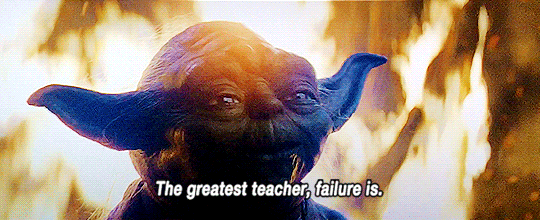
(I just love The Last Jedi, okay??)
Personal feelings: It was kind of sad, in the way any person dying of old age is. It did feel more overtly spiritual than Obi-wan’s death.
Mode of death: Dies of old age, in his own home, in his own bed, with Luke beside him. His death scene lasts a few minutes and he has some last words.
Aftermath: We see Yoda again as a force ghost, which we are expecting as an audience since his body fades like Obi-wan’s did. There is sufficient closure. Luke is present for Yoda’s death and, at this point in the films, is the only character relationship Yoda has left alive--therefore this is the most significant his death can be to someone. Luke doesn’t look overly upset but this is not painted to be a sad death, as death by old age is usually more a fact of life and a nice reprieve from untimely losses.
Narrative purpose: Honestly, it’s been a long time since I watched the original trilogy so I’m kind of stretching here. I’m going to borrow from The Last Jedi and say that Yoda’s death allows Luke to grow beyond his master and stand on his own two feet as a fully autonomous agent of goodness. He no longer has the crutch of wise older men to lean on and must make his decisions on his own. Yoda’s death frees Luke to be the master of his own destiny, now knowing the truth of his parentage and no longer being guided by others to do what they think is best (kill Vader).
Overall response: One of the less impactful deaths in the series, but I do appreciate how it adds to Luke’s growth as a character and transition into Jedi Master.
Anakin Skywalker/Darth Vader; portrayed by James Earl Jones, Hayden Christensen, and Jake Lloyd
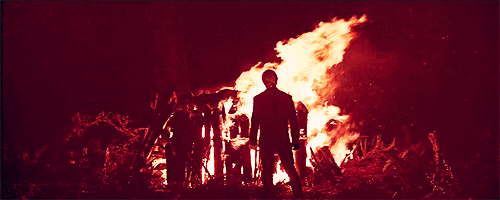
Personal feelings: This is the big one™ of the trilogy, and it shows. Watching Luke trying to literally drag his father to safety is raw and heartbreaking. Seeing him unmasked for his son is chilling. The funeral pyre is beautiful. This definitely made me feel the feelings.
Mode of death: Sacrificed himself to kill Palpatine. Death lasts several minutes. Dies in Luke’s arms and Luke cries as he dies.
Aftermath: Funeral pyre. Force ghost Anakin bringing peace to Luke and cementing his redemption.
Narrative purpose: Too much to list! Reinforcing that good guys sacrifice themselves to protect the people they love. Bringing balance to the Force by killing the Emperor (thanks JJ for messing that up by the way). Finding peace with Obi-wan as a force ghost. Showing that the belief that people can be saved from themselves is validated. I’m sure there’s plenty more besides but this one is so narratively rich that it would take forever to mine.
Overall response: Extreme narrative importance. Basically ties together six movies. Emotional, beautiful, resonant.
Han Solo; portrayed by Harrison Ford

Personal feelings: Ouch, ouch, ouch! This was... this was angsty. I love angsty. I cannot possibly find adequate words to describe how well done this scene and this death was. One of my top three moments of The Force Awakens.
Mode of death: Struck through the chest with a lightsaber by his son, Ben Solo (under the alias of Kylo Ren), after an attempt to save him from the dark side and bring him home. His body falls into the pit on Starkiller Base.
Aftermath: So. Much. Rey screams “no!” Finn is visibly upset, too. Chewie roars in agony and shoots Kylo Ren with his bowcaster. Leia can be seen feeling Han’s death and cannot find the strength to keep standing. Kylo/Ben looks immediately shaken by what he has done. Rey and Leia share a sad hug at the end of the film. In The Last Jedi, reactions continue. Luke is shaken by the revelation of Han’s death and spends a quiet moment in the Falcon mourning him. Kylo/Ben’s reaction continues to spiral. Snoke, in one of my favorite lines in the film, announces that “the deed split [his] spirit to the bone”. Rey grieves Han and accuses Ben of hating him. Luke warns Kylo that he will always be with him, “just like [his] father”. Han’s shadow is felt all over The Last Jedi without him being present. Even without the further reactions in The Rise of Skywalker (Rey saying Ben is haunted by him, the literal memory scene on the Death Star), the impacts of Han Solo’s death are the most significant in the entire franchise.
Narrative purpose: To advance both internal and external character conflicts. Kylo killing Han provides an external conflict between him and the heroes--particularly between him and Rey as Rey yearns for parents who love her and Ben (seemingly) rejects/kills his that do. It also provides a meaty internal conflict for Kylo Ren/Ben Solo, who is the most nuanced villain I have ever seen in film. While Han’s death doesn’t seem to serve a main theme in The Force Awakens (it is my perspective that JJ does not have cohesive overarching themes in his two entries in the saga), it does blend in pretty well with The Last Jedi’s preoccupation with killing the past. The thematic takeaway from The Last Jedi is that you can’t and shouldn’t kill the past, you should learn from it and move on--and Kylo killing Han neatly fits into this theme by showing that Kylo tried to kill his past by killing his father, and yet he was unable to move on because of it.
Overall response: Poignant. Purposeful. Well-crafted. The effects are long lasting and felt throughout the trilogy. This is not a meaningless death. Of the entire saga, this is the death that is given the most acknowledgement.
Supreme Leader Snoke; portrayed by Andy Serkis
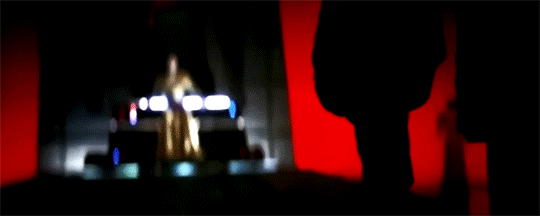
Personal feelings: I was on the edge of my fucking seat. This is not emotionally resonant because we don’t care about Snoke but it was huge and shocking and had these enormous narrative implications moving forward.
Mode of death: Cut in half by Kylo Ren while he narrates his own death.
Aftermath: The Praetorian guards spring into action to avenge their master. In a later scene, we see Snoke’s severed legs topple to the floor. Hux is visibly shaken and angry. Kylo Ren acknowledges the death (by blaming it on Rey) and takes Snoke’s position as Supreme Leader (”the Supreme Leader is dead”, “long live the Supreme Leader”). I’m... going to ignore how The Rise of Skywalker handled Snoke. It was unnecessary to have Snoke clones from a storytelling perspective. It added nothing to the narrative, just used as a clumsy way to justify that Palpatine was really pulling the strings all along.
Narrative purpose: To deepen the perceived conflict within Kylo Ren and showing his unwillingness to kill Rey. This further complicates their relationship moving forward as we’ve established that the new head honcho powerful villain has no real desire to hurt the hero. The narrative implications of this moving forward were so rich. Pity JJ ignored them. Additionally: To show Kylo Ren symbolically surpassing Darth Vader. In Episode III Anakin claims he will overthrow the Emperor and rule the galaxy with Padme. He never achieves this. But Kylo Ren does (minus the Empress by his side). To deepen the theme of Kylo Ren trying to kill/bury the past in order to become stronger (and ultimately failing). To add Snoke to the list of characters in the movie who embody the theme of failure. To shake up an expected narrative trajectory and provide new pathways for future storytelling. (Again, JJ, looking at you.)
Overall response: Loved it. Loved it. Not as resonant as some of the other deaths but by far to me the most shocking.
Luke Skywalker; portrayed by Mark Hamill
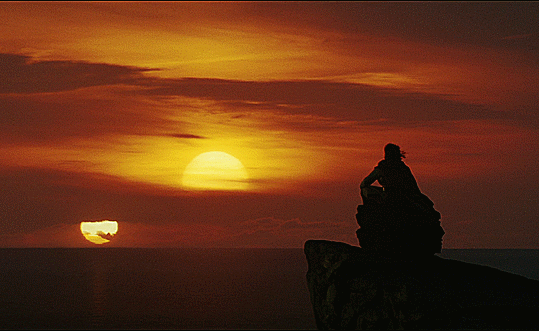
Personal feelings: Okay, this is a big one. Here’s the thing. I did not grow up with the original trilogy. I never really cared for Luke (didn’t dislike him either, just ‘meh’). But this movie. This movie. I went on a journey with Luke. I saw him as fallible. As human. Making mistakes. Failing. Falling into depression. And overcoming it. I cried when Luke Skywalker died. I did not think that would happen. I did not think I would ever love Luke so much.
Mode of death: Force projects himself across the galaxy to face his nephew and save the Resistance; the effort kills him. Luke’s death takes a couple of minutes of screentime, and it is gorgeous. Hamill acts his ass off. The music, the visuals, everything combines to make this the most emotional death in Star Wars--a fitting end for its first hero.
Aftermath: Leia and Rey feel his death in the Force. They speak to each other quietly about it. They know it was peaceful. Luke, knowing he was going to die, came and saw his sister first and gave them beautiful closure and a message of hope. Just before Luke dies, he warns Kylo/Ben that he’ll always be with him. Just like his father. Luke fades into the Force and we know we will see him again as a force ghost (which we do, but JJ managed to trash even that). The boy on Canto Bight and his friends are inspired by the legend of Jedi Master Luke Skywalker. He ignites hope throughout the galaxy once more.
Narrative purpose: Multiple. As above, inspiring hope throughout the galaxy once more. To serve the theme of self-sacrifice. Achieving victory without violence (pacifistic). Preventing Kylo Ren from killing more people he cares about (Rey, Leia, Luke) and thereby protecting him, at least a little, from himself. Also serves a similar purpose to Yoda’s death--with both Luke and Snoke dying, Rey and Kylo Ren are without masters, the arbiters of their own destiny (thanks again JJ for fucking that up too).
Overall response: I can’t decide if this or Han Solo’s death is more emotionally impactful to me. They are both so, so moving, and so essential to the narrative.
Leia Organa; portrayed by Carrie Fisher

Personal feelings: This is hard. I don’t think her scenes in The Rise of Skywalker worked. They were cut from The Force Awakens for a reason--and then cobbled together like some kind of Frankenstein’s Monster for this movie. As much as I love Leia and Carrie, I couldn’t feel emotion for her death because it was so wooden and artificial.
Mode of death: Uses the last of her energy to reach her son (it is unclear exactly how she is reaching him. Force projection? Did she create the Han memory? Who knows.) Even with so little to work with, they still managed to focus on her death with her lying down, her hand falling to the side--trying to give this some weight.
Aftermath: Chewie mourns. Ben and Rey both feel her death and are clearly devastated. The Resistance gather around her body in mourning. Her body fades at the same time as Ben’s (wtf, JJ) and then we see her as a force ghost with Luke (but not Ben because fuck him apparently).
Narrative purpose: To bring her son back to the light, something that has been a central struggle of this trilogy. Sacrificing yourself to save that which you love.
Overall response: It has a purpose, but I can’t help but think it wouldn’t have gone this way if Carrie hadn’t died. It doesn’t seem as organic as the deaths of Han and Luke.
NB: I’m skipping Palpatine because his death was literally nothing else than “defeat the big bad”. It wasn’t even fulfilling a prophecy, it had no significant narrative weight for Rey, it was a nothing burger.
Ben Solo/Kylo Ren; portrayed by Adam Driver

Personal feelings: Twofold. In the cinema, I felt nothing. Nothing. I actually laughed in surprise. Like, “what was that”? The next day, at home, I cried. I don’t think I cried because he died. I was open to that possibility. I cried because I was so, so angry at how poorly his arc and death was handled. Like he was a footnote in his own fucking story. I think him living was a much more interesting story, narratively and thematically, but I wasn’t necessarily opposed to his death if it was done well. And it wasn’t.
Mode of death: Uses the last of his life energy to resurrect Rey. Falls over. (Plop, there he goes.) Fades into the force.
Aftermath: Like, none? Rey looks kind of surprised and blinks for a couple of seconds. No words are exchanged. He just tips over and dies. Cool.
Narrative purpose (or failure thereof): I am fucking reaching here because all of the previously established trajectories and themes are dashed by this ending. We could argue that this is a self-sacrifice to save what you love theme point. Which is fine, but like, no one mourns. He doesn’t become a Force Ghost. No one acknowledges his death. Ben fading into the Force is a metaphor for him fading from people’s minds. It’s like he doesn’t even exist in the context of the story anymore. Which is insanely baffling because all three of the original trilogy heroes sacrificed their lives, at least in part, to save Ben Solo. So that he could in turn save Rey? So he’s just another cog in the machine? This was always about Rey and never about the love Han and Leia had for their son, or that Luke had for his nephew? If you think about it, the only other ‘main’ characters to die during the course of their trilogy were Qui-gon and Padme. And both of those characters had funerals, and people mourning, and huge narrative implications. The death of Ben Solo reads like the death of a minor character. It serves one very narrow and already over-represented theme. The death of all of the rest of the Skywalkers had huge emotional ramifications for the other characters in the films. With Ben Solo, the Skywalker legacy fades as well, as if JJ is telling us that this saga was not about this family at all, but their whole story existed only for the point of saving Palpatine’s granddaughter. How fucked up is that?
Overall response: Narratively, this just doesn’t make sense. It’s lazy and not impactful. When a character dies in films, you want the audience to feel something, so you show other characters reacting to it. Are they sad? Then we should feel sad too! Are they elated? We should be celebrating! No one reacts to Ben’s death, so we’re not sure how we’re supposed to feel, either. The people who are devastated by this death are the ones who love the character itself and are upset that he got treated this way--the death itself was hollow and emotionless.
So, there you have it. Ben Solo was shafted. Death is extremely prevalent in these movies, and yet, being the only new Skywalker of the sequels and half the protagonist (thank you Rian), Ben Solo has arguably the least emotional or narratively impactful death in the franchise.
Rian Johnson would never do this to Ben Solo.
#ben solo#kylo ren#reylo#star wars#star wars meta#sw meta#qui-gon jinn#shmi skywalker#padme amidala#obi-wan#anakin skywalker#han solo#snoke#luke skywalker#leia organa#tros spoilers#sw negativity#wordy#meta#mine
3K notes
·
View notes
Text
Mars Red, Overview (1)
Welcome to the first episode of a series I'm calling "Vampire Anime Slapped Harder Than I Expected, Here's Why" /j. This is just an overview. No spoilers here.
Now, if you didn't know, I'm currently watching an anime called Mars Red. Here's the summary on My Anime List:
In the year 1923, a vampire crisis takes Tokyo by storm. Provoked by the illegal trade of "Ascra," an artificial blood source, the population of vampires begins to rapidly increase within the city. Under orders from Lieutenant General Sounosuke Nakajima, the Special Forces Unit 16 gathers vampires within the military to create a new undercover vampire-hunting unit known as Code Zero.
Leading the unit is Colonel Yoshinobu Maeda. Responsible for locating the source of the Ascra trade as well as capturing and killing vampires, he is pressured into producing fruitful results amidst the growing criticism that threatens to decommission the unit. To make matters worse, the vampires within the unit are struggling to grasp their newfound powers and identities now that they are no longer human. With the world at odds against them, the members of Code Zero must find a way to curb the crisis or otherwise fall victim to their own demonic natures.
Now, this summary is technically true. But it's also...I wouldn't go so far as to call it misleading, but it's certainly not indicative of the latter half of the anime or the themes that overwrite it as a whole. Both this summary and the trailer market Mars Red as this battle-type anime, maybe something in the realm of Jujutsu Kaisen or Moriarty the Patriot in production, if not exactly aesthetic.
I expected epic vampire fights, basically. Some good plain fun, maybe a little bit of intrigue. Maybe some hamfisted conflict and self-loathing about "nooo I miss being human, I'm a mOnSTer".
...Does it deliver?
It did at the start, and then it subverted my expectations pretty spectacularly. If you do decide to watch it, it's very much a darker, somber thinkpiece rather than a battle anime. it has a lot of things it wants to say about the relationship between humanity and death (because vampires can't actually die of old age) and the shift from a militarized state to one more peace-oriented. There's a pretty striking metaphor for westernization used in the latter half the anime (thank you to Xue @scalpel-mom-mori for pointing this out to me).
So what's it like, really?
Mars Red is the kind of anime that isn't sanitized for western audiences. It's harder to digest. By sheer virtue of its setting, it's already really deeply entrenched in Japanese history, and rather than rejecting that, it leans into the historical and cultural context. The dialogue has a lot of worldplay in the original Japanese, for example.
And at the same time, it juggles references to a lot of western media. For example, episode one is thematically centered around Salome, a play by Oscar Wilde. So if you're not well-versed in plays (like I am) a lot of references are hard to catch.
Should you even watch it?
YES. See, despite the initial hurdle of cultural ignorance on my part and a sheer disinterest in plays that I've had since childhood, I still love this anime.
I'd say it's because of how clever the writing/direction is (see this post I made about two shots telling a whole story in episode 1), but it's also because the characters are genuinely likeable. They're funny, they have heart, they all stand out for different reasons, and their relationships with each other are written with a whole lot of care.
Like Suwa, for example, who I personally think is one of the best-written members of Code Zero. He could easily have fallen into the trope of "gruff, jaded soldier who hates humanity". And it looks like he falls into that trope pretty early on. He's prickly, kind of a lone wolf, and cynical.
But it's around episode 4 that Suwa starts to be more than just that trope. I couldn't find a clip of it anywhere, but he has this really powerful interaction with a 15-year old prostitute (no, it's not what you're thinking, stop it). It starts here, at 9:11 to about 12:05, and doesn't spoil anything about the plot.
It's my favorite scene from this anime and it's pretty indicative of the overall tone, writing, and direction of Mars Red as a whole. Give it a watch if anything I've said at all interests you, see what you think.
Not to mention, the art is gorgeous, the OP and ED are lovely, and it's a pretty short watch. It's currently got 11 episodes out and will end at 13, so you could binge it in a day if you wanted to.
Anyway. More essays will be forthcoming, though they'll probably be spoilery. It'll be a couple weeks before any of them get published though--just gotta wait for Mars Red to finish coming out. I hope you enjoyed the read if you stuck around this long. Have a wonderful day!
24 notes
·
View notes
Text
CQL Rewatch - Ep 22
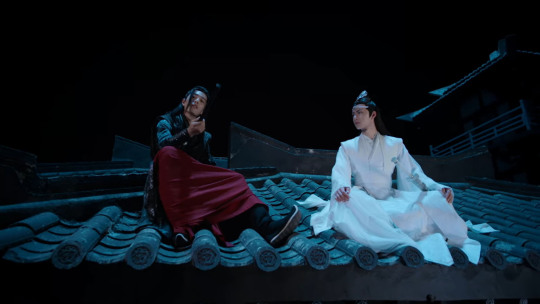
It feels so good to see these two together, talking about old times, and most importantly, not arguing. It's as if this was the conversation that was meant to happen back in Yiling, but it didn't because emotions were too high. I guess it's true that absence makes the heart grow fonder. Wei Wuxian has time to think about and come to the understanding that Lan Wangji isn't fighting him, but instead showing concern. And Lan Wangji gets to hear Wei Wuxian's side of the story, about what he did those three months in the Burial Grounds. It's so refreshing to have this release after so much tension had built up, where the two of them are just open and honest with each other. And you can see how Wei Wuxian's relationship with Lan Wangji is different from his relationship to everyone else. While we get to see him being vulnerable with Jiang Yanli, he won't tell her everything; we see him connecting with Jiang Cheng again, but as is his temperament, Jiang Cheng is often flippant and dismissive, and only really cares that Wei Wuxian is back within the Jiang Clan fold. Lan Wangji really cannot be satisfied until he knows what's been going on; he wants to be reassured that Wei Wuxian is okay in both mind and body, he wants to know that he's not gone to the dark side per se.
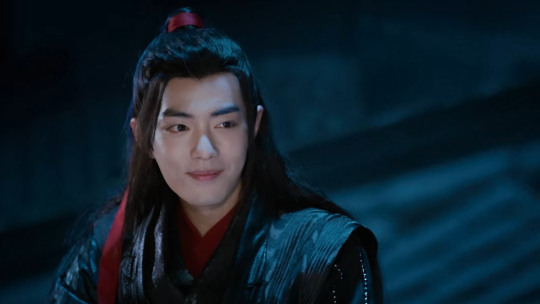
And this moment is so pivotal here. Now that they've finally talked and gotten everything out that they've both been ruminating on over the past however long (idk timelines lol), Wei Wuxian is in a place where he can say he'll accept Lan Wangji's help. Wei Wuxian doesn't agree to it begrudgingly, but I think it's a hopeless agreement. Unless you know about his lack of a Golden Core, his response seems odd--maybe you think he's tired, maybe you think he's just doing it to appease Lan Wangji, but is being dishonest. With the knowledge of the transfer, you can see that he is agreeing to appease Lan Wangji, but not in a lazy or dishonest way: he knows that he can never learn the sword again, but he allows Lan Wangji to at least help him with his temperament. I don't think it's him agreeing to get Lan Wangji off his back, I think instead he's letting Lan Wangji know how important he is to Wei Wuxian--he's special.
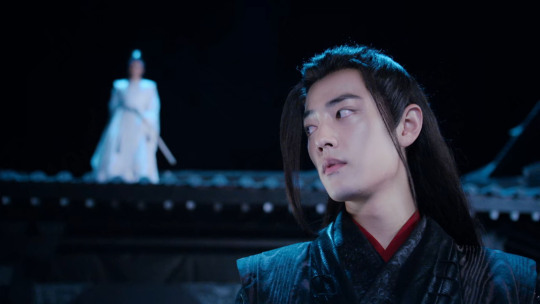
After Wei Wuxian agrees to letting Lan Wangji help, he walks away smiling. He doesn't let Lan Wangji see it either. I feel that he's indescribably happy that with so many changes in his life, he has his relationship with Lan Wangji back--he has his best friend, he has someone who he can trust. And remember, he's not concerned about his temperament being overwhelmed--Wei Wuxian has always considered himself a prodigy, so while this is challenging, he believes that what he learned from the Gusu Lan Clan is enough. Lan Wangji, on the other hand, is still very concerned, and he devotes all of his free time to figuring out ways to help Wei Wuxian, to steady his mind and temperament.
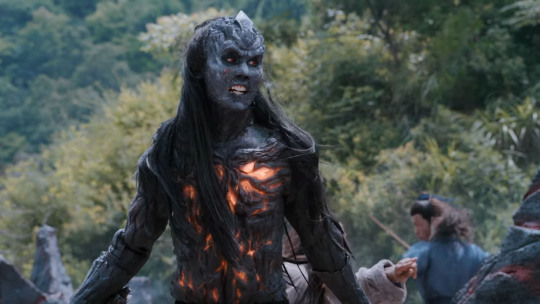
So, while I'm watching this filler, I'm imagining a terrible scenario they could have done. When you're adapting a book or a play or really anything, it's not uncommon to add scenes, right? CQL has plenty of added scenes for context and padding, plus shit they just made up. Okay, so this would fall into the latter category. Imagine if they had had Lan Wangji get turned into a puppet/Urukai, and then there's some big, dramatic way that Wei Wuxian has to save him and turn him back, and it only brings them closer together as brothers in arms/whatever bs they were trying to sell us without making it romantic. Sounds like a terrible idea, right? Aren't you glad the writers had enough integrity and respect for the novel that they didn't do that? I complain about things that were added or changed as well, but if they had given me an actual explicit acknowledgment of wangxian love, I would have been happy. Of course, censorship is a bitch, so that's a no go. The point of this is that it could have been a lot worse.
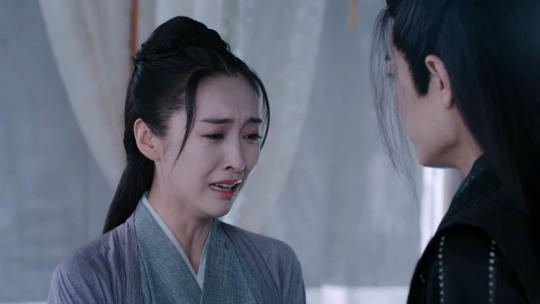
Oh, god. Soup drama. Thank you to that person who posted the soup drama in Lan Wangji's POV. You are amazing, and that post always makes me cackle.
Ah, but this is canon to the novel if I remember correctly. It's totally valid and is actually kind of sad for Yanli, but I still think it's hilarious the way Wei Wuxian just takes off like a shot without knowing what's going on. The thing is, Jiang Yanli is just embarrassed about the whole thing and wants to leave, but of course Wei Wuxian wants revenge. He still harbors no love for Jin Zixuan, and any chance he gets to put the peacock in his place, he'll take.
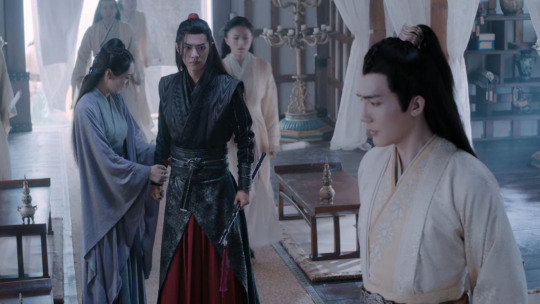
Yanli is tugging on him with both hands, and Wei Wuxian doesn't move. He is just standing there, glaring at Jin Zixuan. There are two people in the world who Wei Wuxian will defend forever: Jiang Yanli and Lan Wangji--and Jin Zixuan has just offended one of them. Wei Wuxian is beyond pissed. And now couple that with how he was trapped in a sunless graveyard for three months, has been doing nothing but fighting since he's been out, and is using his spiritual power in a dangerous and unstable method. His mood, my friends, is not great right now.
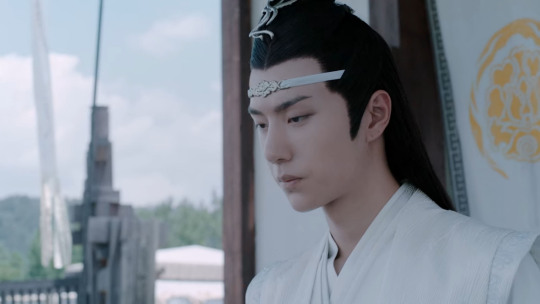
I love how Lan Wangji looks inside the tent, and then proceeds to immediately nope out of there. I blame that soup drama post for everything that I see now, because it really does look like he's just thinking, "Ugh, soup drama again." But in all seriousness, I think this is just Lan Wangji feeling awkward again. I think he came out of genuine concern for Jiang Yanli, because remember Wei Wuxian took off without even hearing what was going on, but when he sees that it's clearly a matter between her and Jin Zixuan, he leaves. This isn't his business, and it also involves romance, because of course he remembers how they were betrothed until the fight broke out in Cloud Recesses. Regardless of how Lan Wangji carries himself and how he's so respected as a cultivator, he's still a young man, who still feels awkward about the idea of love and doesn't really want to be around any of it--lovers' quarrels and whatnot.
The other thing is, they don't pan over to Lan Wangji for no reason. Perhaps he's still remembering the conversation he had with Wei Wuxian and Jiang Cheng back in Yiling: this is a Jiang Clan affair. And this time, he's choosing to bow out when he realizes it isn't his business. However, he doesn't want to go far, because he knows how dangerous Wei Wuxian really is, especially if he loses his cool.
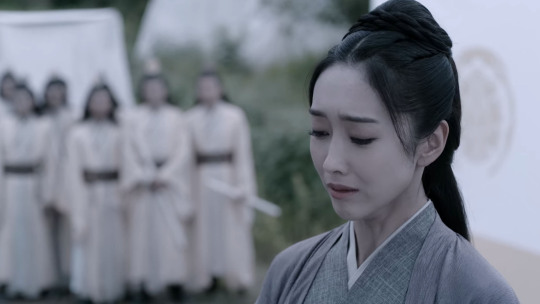
Honestly, Jin Zixuan is such a dick here. Every time I think he's made progress, he takes a step backward. Jiang Yanli is the sweetest person, and is just giving him soup every day to provide him with some comfort. We're to understand that she is a good cook and her soup is The Best, so she wants to do something nice for him, perhaps bring him the comfort of home in the place that is farthest from home, and he practically throws it back in her face. It's a total misunderstanding, but my heart breaks for her. And after this moment, Jin Zixuan starts to try harder. I think he finally sees who she is, what kind of person she is, and understands how genuine and loving she has always been. He finally opens his eyes and gets to know her as a person, not as the girl he's engaged to, not as the girl he was engaged to, not as the girl his parents want him to marry--but as the girl who he's interested in.
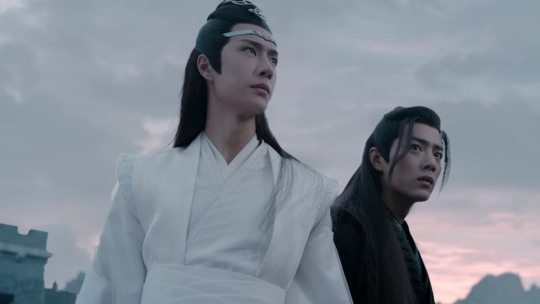
Not a lot to talk about this episode. I swear, half of it is just fighting. But let's take a moment to appreciate Wei Wuxian and Lan Wangji fighting together. I am a sucker for this sort of thing, so I love seeing Lan Wangji swoop in and knock a baddie's sword out of the way to protect Wei Wuxian. It feels good seeing that and seeing them on the same side, fighting together.
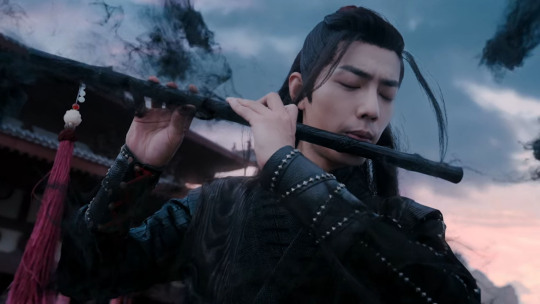
Wei Wuxian tried it their way. He tried to fight without using Chenqing, but the fight was impossible. As stated before, the puppets are unkillable, so there was no way to win just by fighting them, and obviously what Nie Mingjue was doing wasn't helping. The only way to survive at this point was to try and control the puppets into working against Wen Ruohan. There's a shot of Lan Wangji before this, where he looks concerned, but I think he even knows that they had no other choice.
This was a short one, sorry! But really, I'm not going to babble about nothing. So much fighting and not a lot of dialogue or other things really happened. We're just getting through major plot points right now to be honest.
Other episodes: 1 | 2 | 3 | 4 | 5 | 6 | 7 | 8 | 9 | 10 | 11 | 12 | 13 | 14 | 15 | 16 | 17 | 18 | 19 | 20 | 21 |
Or just check out the #CQL Rewatch hashtag
#wangxian#lan wangji#wei wuxian#cql#the untamed#jiang cheng#jiang yanli#mdzs#mo dao zu shi#ep 22#cql rewatch
13 notes
·
View notes
Photo
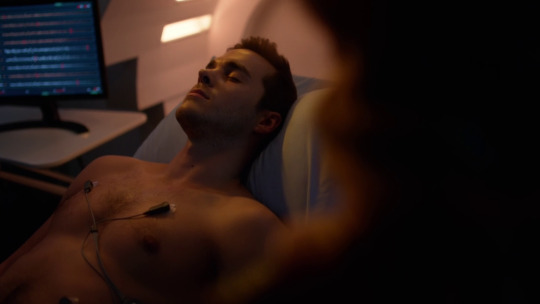
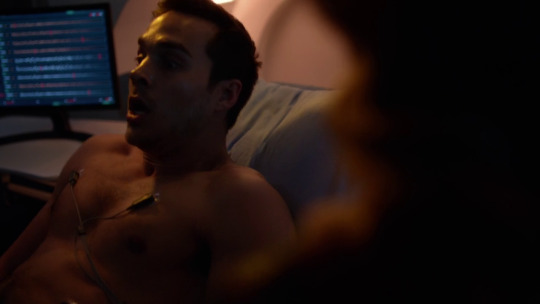
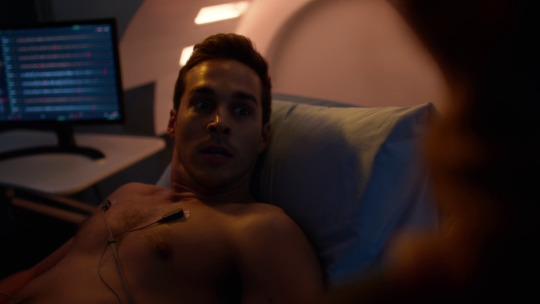

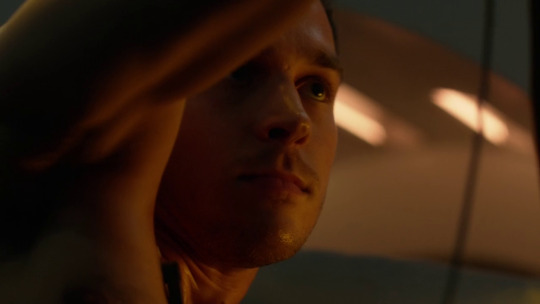

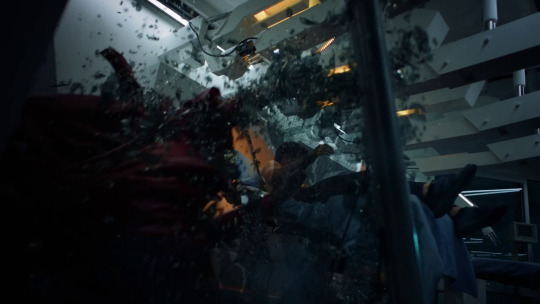
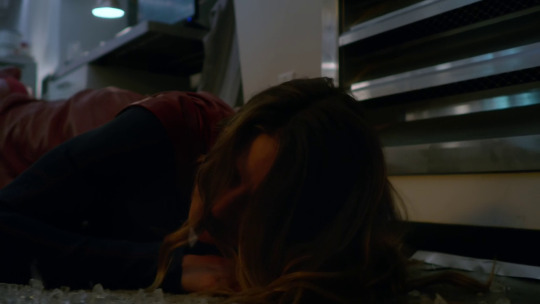
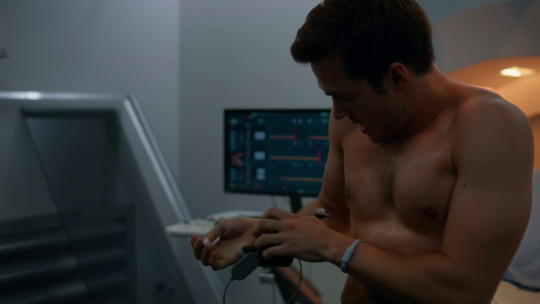
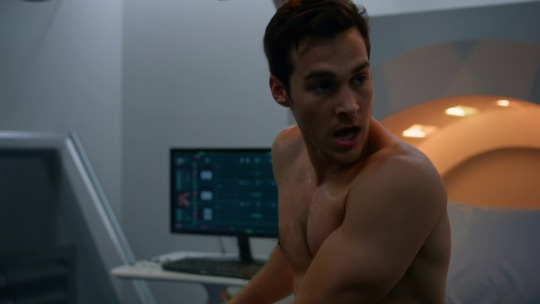
So, I guess this is the controversial one?
When I watched it, I can't say that it phazed me very much. Structurally, it was just clear to me that the purpose of this scene was to provide a cliffhanger and to kickstart an action plot and I accepted it as part of an action plot.
I also accept it as part of genre that has a long history of "team up" stories where two characters meet, have some sort of misunderstanding of special circumstances like mind control, fight each other and then find out they are on the same side.
"Waking up disoriented from a year long come" to me falls squarely into this category and this is where group this morally as well.
Mon-El is just waking up from essentially a coma, the last thing that happened before he went into his coma was death and destruction raining down around him and him not knowing why.
He wakes up, a stranger is leaning over him, he lashes out and runs away.
I do think that it is worth pointing out that it's just not true when people claim Mon-El "tried to kill her" in that scene. Yes, if she had been a human, there is a chance she might have gotten hurt or seriously injured, but Mon-El at this point wasn't even aware he had superpower when he threw her (in fact he doesn’t really realize that until the next person he encounters).
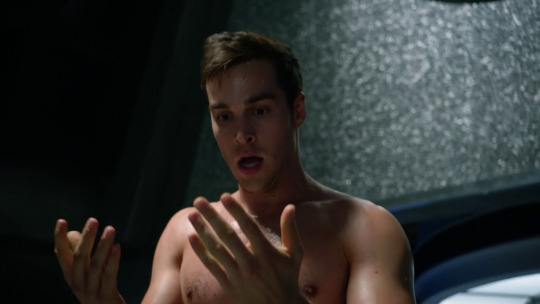
What he does is: he grabs this stranger leaning over him, throws her away and then runs away.
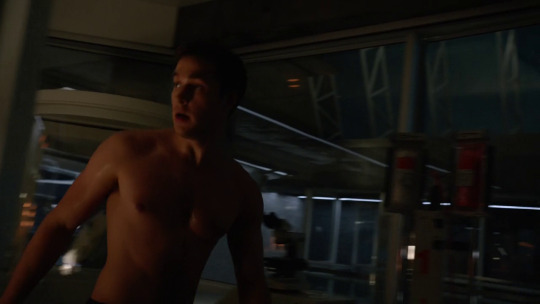
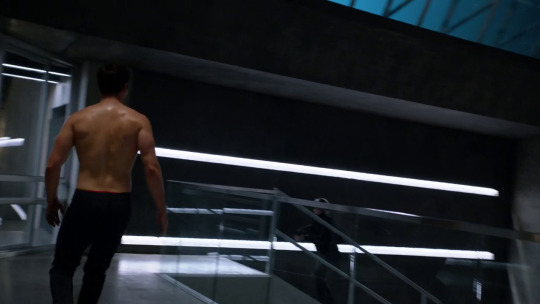
If he had been actually killer minded, I would expect him to get up and try to kill her while she is down. Or even just try to knock her out more consistently ("incapacitate perceived threat"). But that's not what he does. As soon as he has gotten her out of the way, he moves on to his next objective and runs away.
(my personal head canon is that as a prince Mon-El might have been taught that there is a good chance that enemies might try to capture him and how to react in that situation. A fankwank take could even be that when destruction rained down on Daxam maybe he thought they were under intentional attack by Kryptonians and that those Kryptonians might come after him and capture him)
In short, if this was any kind of legal context, Mon-El could easily and believably claim some sort of diminished capacity, because he was disoriented after waking up from his coma type thing (during which they technically experimented on him).
Furthermore, to me it seems pretty clear from Kara's characterization that she doesn't hold this moment against him at all either. Note the scene afterwards where she is still shows empathy towards him (”He must be dialing Krypton, he doesn’t know it was destroyed”) and only changes her attitude towards him after she finds out that he is a Daxamite. Or how she generally doesn’t seem that concerned with the situation as she fangirls over the president and focuses on getting her article right. And even in Karamel’s most vicious arguments, this is never brought up, regardless of whether the argument is about Mon-El’s suitability within a relationship or before that when the subject is generally his poor moral character. (that said it can be seen as a weakness of the scene that Kara stays down unually long, so Mon-El can fight the DEO agents and escape without her interrupting, without the show providing any explantion for it)
Another thing worth noting is that Mon-El in this sequence is unusually effective at taking out DEO agents for a guy who just woke up from a coma and isn't used to his own strength.

Especially compared to the rest his story suggests more that Mon-El wasn't much of an experienced fighter and had to be taught. I remember some comic fan channels based on this scene thought that he must have been a well trained Legionnaire who was just lying about his prince back story and about not being experienced.
To me either characterization makes sense in general. Either that Mon-El would have received some self defense training as a prince or that Mon-El is bad at combat because he was a playboy slacker who wasn't interested in violence.
But I do feel those characterizations are at odds with each other. So personally, I feel like the majority of Mon-El's episodes point more towards the slacker interpretation (and even this scene has multiple shots of his showing surprised, so I think the overall vibe is that we are supposed to get from this is that he mostly lucked into his “victories” here), so I consider his combat abilities here the odd one out in regards to characterization and mostly just ignore it. It's just adrenaline rush or whatever.
Bonus picture:

12 notes
·
View notes
Text
Kawoshin “Chrysalis” doujinshi by Nobi Nobita/draft artist, analysis
**Scanned and translated doujinshi in the cut tag **
This doujinshi appears in the special June magazine “mook” (portmanteau for magazine / book), entitled “Like a Cruel Angel,” and it’s written by the artist that created the illustrations for episode 24′s early drafts.
It’s pretty much the same narrative vernacular about what happens at the end of episode 24, except the artist begins the short story with an interesting thematic element concerning the noisiness of cicadas, a summer bug in Japan.
** SOME NOTES **
>> There are a few blurry pages. I’m not sure how they ended up that way when I went to upload them, If anyone REALLY needs a cleaner copy of a certain page, please reach out to me.
>> When Kaworu says “I am 14 years” he literally says 僕は14年, I’m assuming he’s either continuing to talk to Rei given the very last scene with the Rei clones, and hinting that *he’s* been in his own aquarium for 14 years, OR he’s now talking to Shinji and referencing his lifespan in the context of the cicadas.
>> He also cryptically says “I think I’m also the 3rd one.” Not sure if he’s alluding to the fact he is on his third cycle, third clone, etc.
>> “Target lost” doesn’t mean they lost sight of Kaworu obviously...in Japanese, “lost” can mean “loss of life” lost soul, etc.
>> Shinji is reflecting back to a memory from the TV series when he sleeps in Kensuke’s tent out in the field. The episode did not have a lot of dialogue, it focused on sounds, and the sound effects for cicadas grew intensely the further away from people Shinji ventured outward. I had personally always interpreted this to mean that no matter how far he tries to run away, the deafening of his problems will always follow him.
>> There are only five pages in this doujinshi that do NOT have the sound effects for cicada chirping written across the pages. So it’s an ongoing element to show that he doesn’t easily escape them, and mirrors his earlier line in the doujin “the neverending summer continued.” This “neverending summer” will continue as Kaworu’s clones emerge, meet Shinji, and tragically die.
>> The cicadas symbolize Kaworu and his clones in this story in a few ways: He mentions they “emerge from the ground” after the 7th summer, and die after 7 days.” The last image in the doujinshi depicts a swarm of Kaworu clones underground, ‘in the soil’ just like the cicadas. Kaworu understands his own death and seems to be aware there is a cycle with himself, too. Shinji holds him with Unit 1′s hand and it immediately after shows him holding the cicada the same way.
>> The way Kaworu talks to Rei could be seen as her also being one of many cicadas that are caught and confined in a “basket” / dummy plug system.
>> The counting on the last page of the doujinshi equals to four summers. He mentions earlier that he “thinks he is the third.” So, if he is likening himself to the cicadas, then it is going to take “four more summers” to emerge from the ground (you can clearly see the symbolic placement of the Kaworu clones appearing to be underground) this last scene mirrors the earlier conversation he had with Shinji about the lifespan of the cicadas. This could be hinting at early ideas of there existing some type of time loop or cycle time line within the series, albeit just fan work of the storyboard artist. Whether or not his clones really are underground is open to interpretation, since Shinji does ask what he is doing “in a place like this.” Kinda creepy o . o
Hit the jump for my translation of the doujin:
“Chrysalis” by Nobi Nobita
Translated by me / Diko Linnai
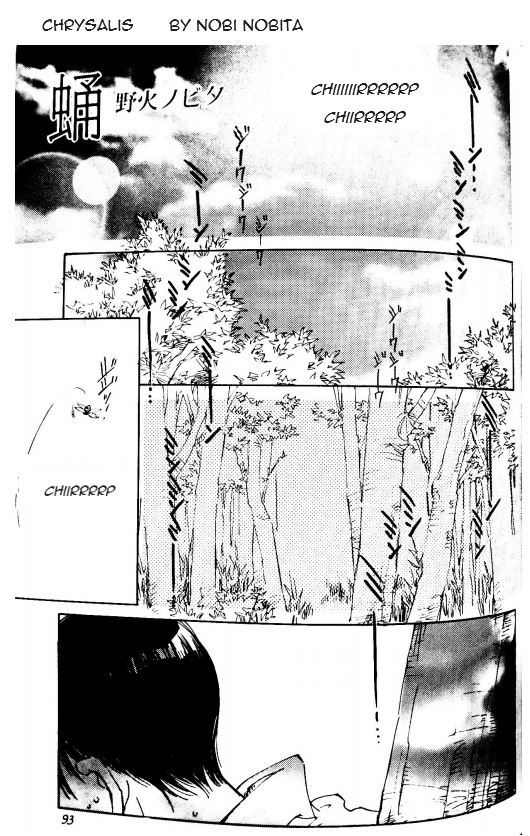
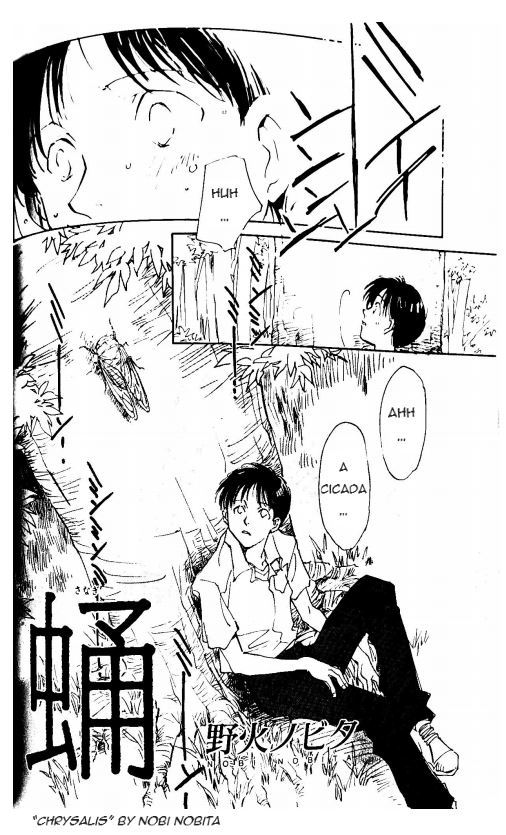
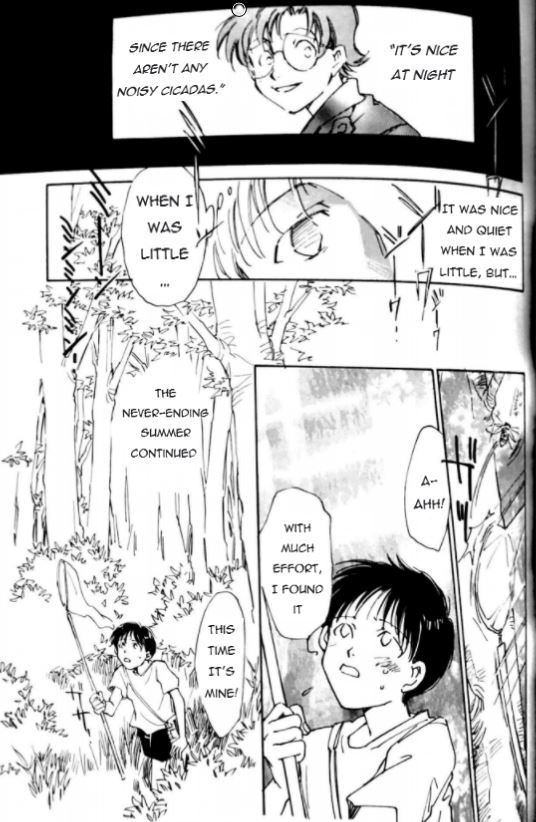
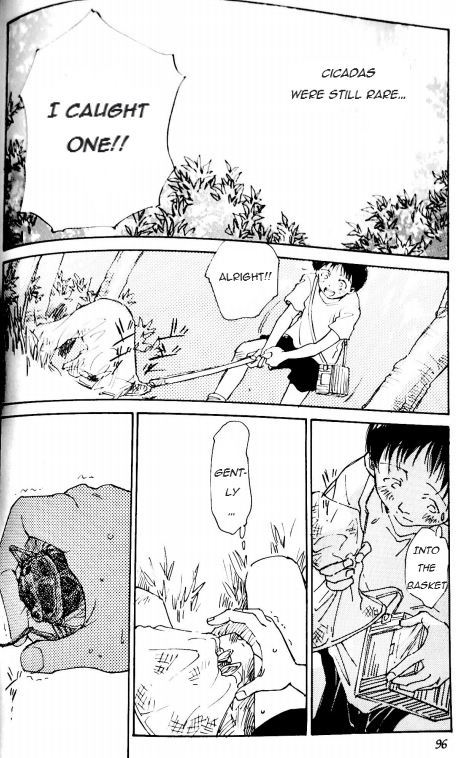

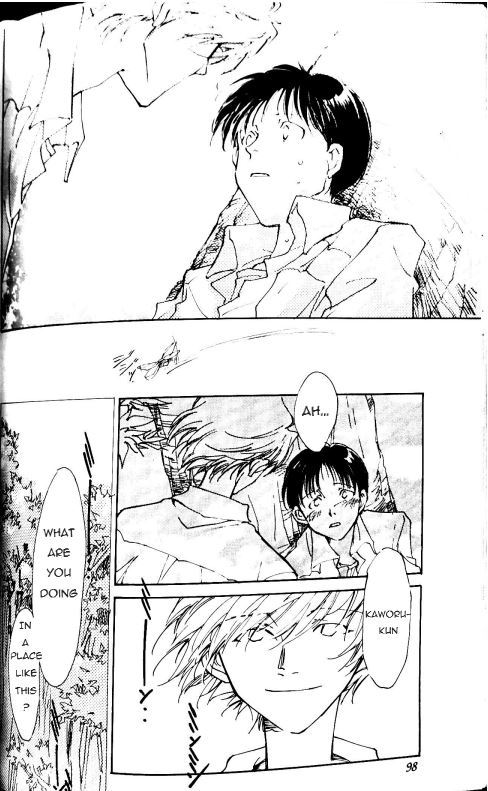
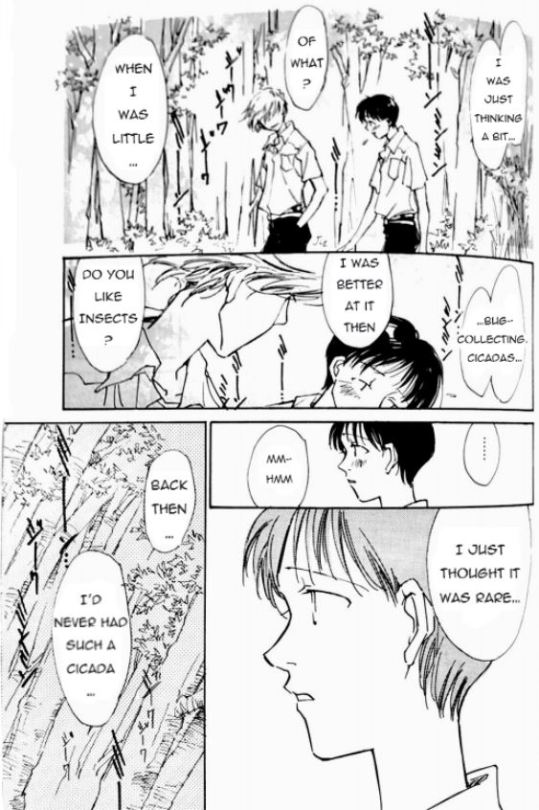
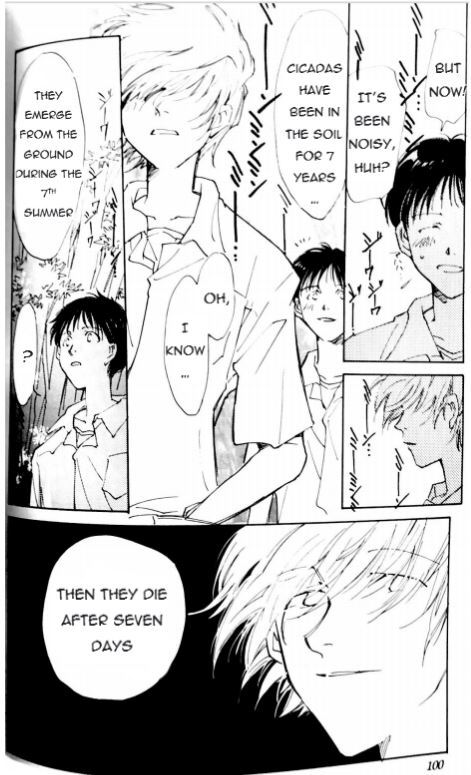
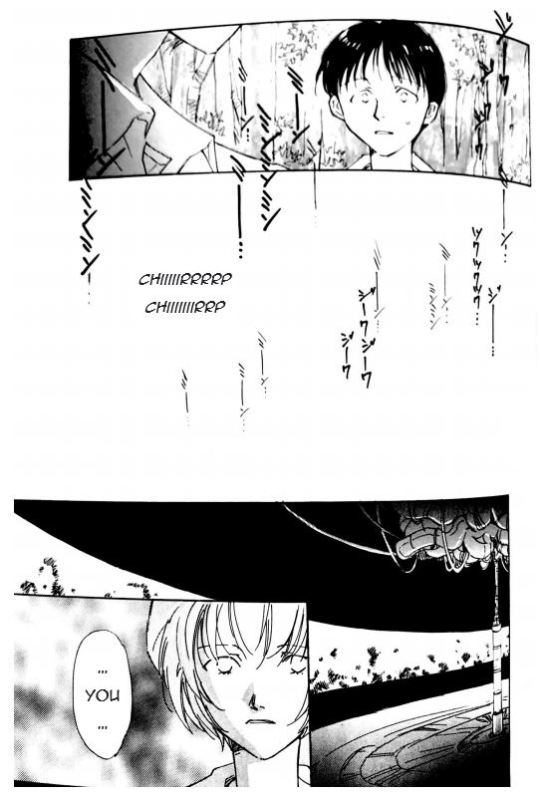
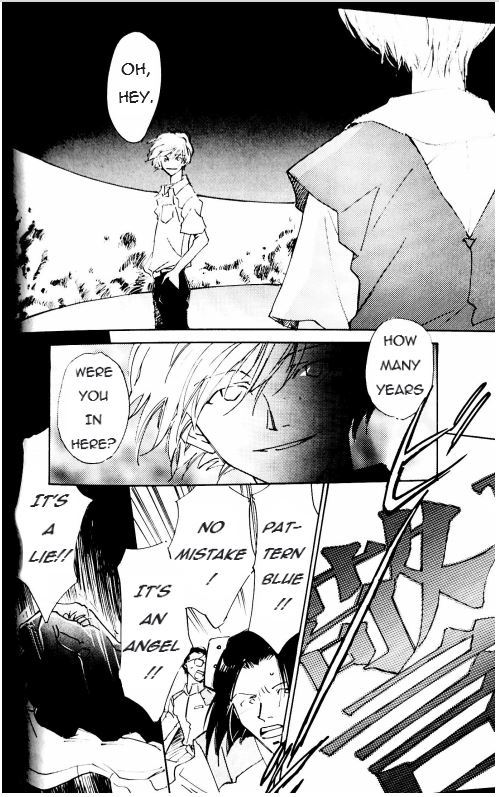

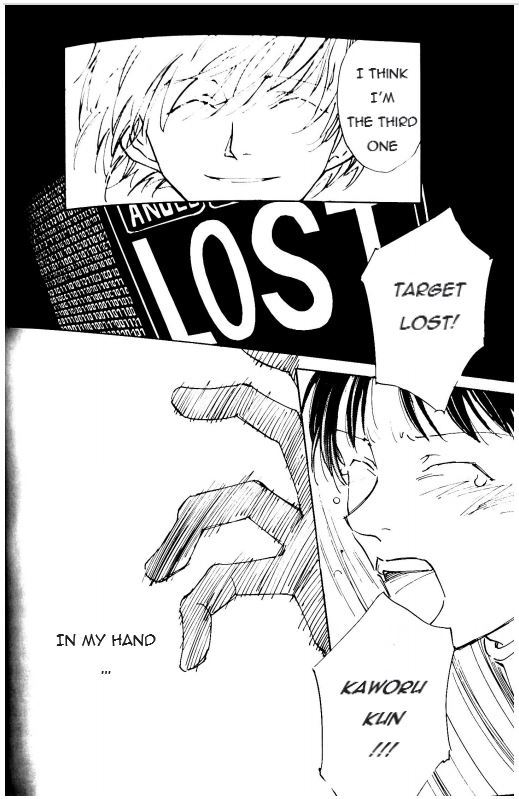
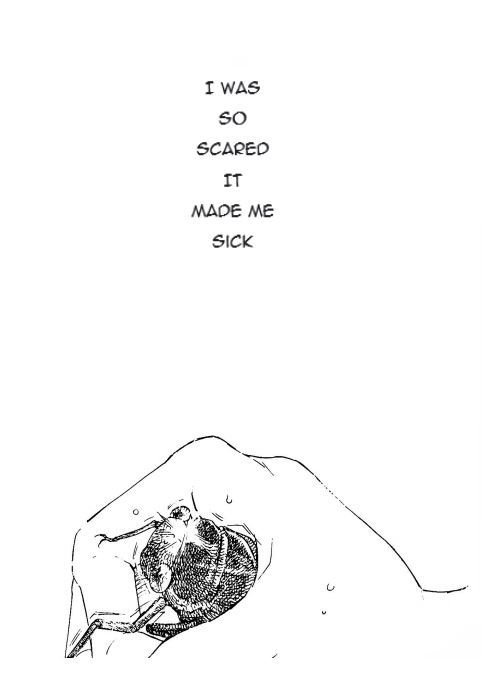
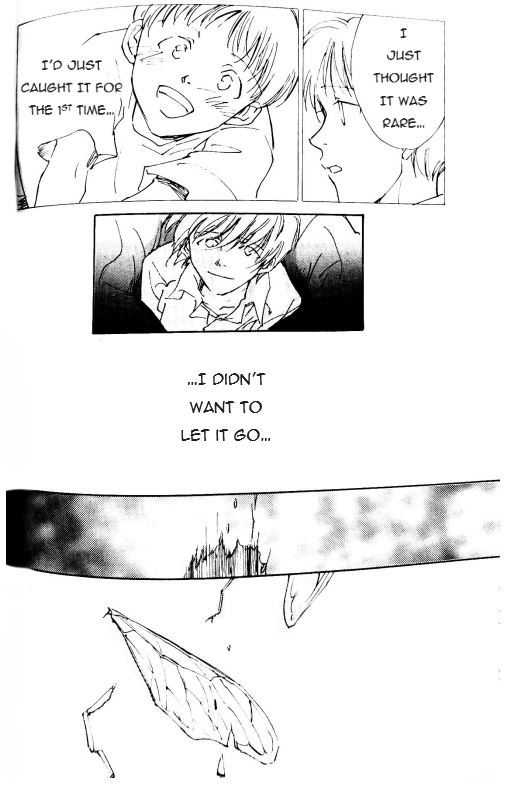
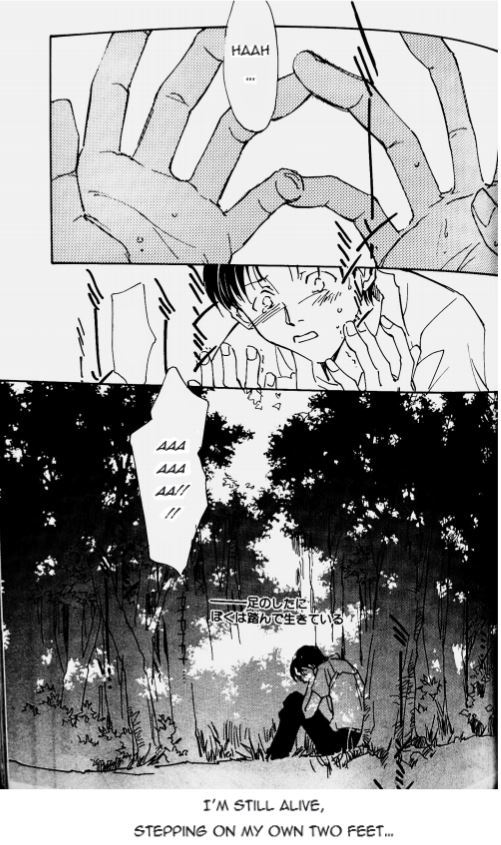
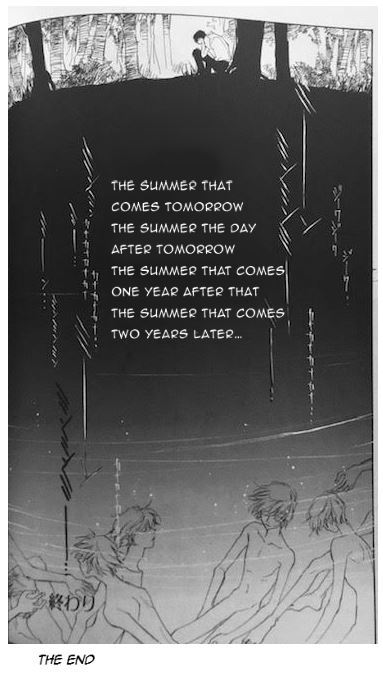
85 notes
·
View notes
Text
Runeterra Retcons 1: Thresh
This is something that I did today. I plan to make this an on-going series (might even take it to YouTube someday if I get the nerve to share my voice), but for now have it as a tumblr post.))
The world of Runeterra is one of the most interesting and complex fantasy settings in modern gaming; a fictional realm bustling with fantastical beings, characters, and a wide variety of plot points offering near endless potential for story-telling. The story of League of Legends is not, in fact, a singular narrative, but rather a collection of different stories spread out across a variety of fictional countries, continents, and even dimensions.
Runeterra as we know it today wasn’t always like this, however; in 2015 Riot Games opted to effectively reboot the lore of their world to be rid of the more restrictive plot elements like Summoners and the Institute of War to allow themselves more wriggle room to tell the stories they wanted to tell. While the decision to effectively make League of Legends non-canon to its own story was initially controversial, the writers of Riot Games have effectively proven themselves extraordinarily capable of using this newfound freedom to its full potential… For the most part.
With a retconned world came the need to retcon characters; Riot has made a substantial effort in the last few years to reimagine and redefine the backstories of the iconic Champions to make them fit into the new narrative, albeit with mixed results. Let’s face it: no writer is perfect and hindsight is 20/20, so a number of characters throughout the years have been left with less-than-stellar backstories compared to most of the roster.
Welcome to Runeterra Retcons, a series in which I’ll be analyzing some of the more controversial champion bios in the game to pick apart the good, the bad, and the horribly missed opportunities. With all that out of the way, let’s begin, shall we?
Episode 1: Thresh
Thresh is at once both an interesting and a bland character. He’s arguably one of the more iconic characters in the game, to the point where he’s practically become the unofficial mascot for the Shadow Isles. In-spite of this, I’ve long felt that Thresh is one of the most awkward fits into the region; before we can discuss the problems with his current lore, however, we first need to address Thresh’s backstory pre-retcon and see if we can analyze the core of his character.
Insert original lore here
So, we can see the concept behind Thresh’s character pretty easily: he’s a jailor who loves tormenting his charges, so much so that he continues to do so even after death. If you were to describe Thresh in a single word, it would probably be “sadistic.” Unfortunately, the original lore doesn’t give a lot beyond that; not where he’s from, not when he died, not even where his prison was located. The bio itself literally says that no one knows the details, and while that does add a faint air of mystery to the character, it doesn’t do much to tie him into the faction he’s supposed to represent: The Shadow Isles.
With that out of the way, let’s now take a look at Thresh’s new bio and see how Riot decided to change him after the retcon.
Insert new lore here
Alright, so, there’s a lot to unpack here. Perhaps the most notable change is that Thresh went from tormenting people to… Tormenting “living relics.” The relics are offered no further explanation in the lore or given any prior context. There’s just… A mirror with a soul in it. There’s a sentient book hidden down in the vaults. For some reason, the monks of the Isles even decided to stash a living person down there because he infused his body with raw magic. Why? Who was this person? What did he do to end up in chains? If this was a dangerous mage, wouldn’t it be better to build a proper prison for him rather than stuff him in a vault full of powerful, dangerous artifacts?
There are so many mysteries here, but perhaps biggest one is this: why was Thresh changed from a warden of people to a warden of relics? Why did they feel the need to turn him from a jailor who enjoyed tormenting his inmates to a curator that was slowly corrupted by the very magics meant to help him do his job? Well, I believe that’s meant to tie into the change made to the Shadow Isles themselves, or rather, the Blessed Isles.
While we never had much info on what the Isles were like before becoming an undead haven, a lot of the lore suggests that they were effectively a paradise, hence the name “Blessed Isles.” This was a place without war, without starvation, without corruption. Naturally, there would be no criminals in paradise, and so this of course means that to make Thresh a warden of things that are inhuman… At least, this is the thought process one might have until they introduce the mysterious regenerating mage, but I guess he’s meant to be one bad egg amidst the crowd, assuming he even came from the Isles at all. Again, it’s never really elaborated on.
So, while the change does make a degree of sense, it kind of feels… Flat. I mean, a guy who enjoys tormenting prisoners in their cells to hear their screams sounds a lot more terrifying than a guy who just stops his sentences halfway through to spite a book. Also, the fact that his lantern just becomes a seemingly endless vessel for souls because of the Ruination is a little silly; like, I know the Black Mist does all sorts of nonsensical things to matter, but the fact that an ordinary lantern gets turned into a relic arguably far more dangerous than anything Thresh was ever guarding seems kind of backwards, at least in my opinion.
So, how can we change this? How would I, personally, retcon Thresh if given the chance? Well, there are a lot of base elements that I would keep, but also some key components I’d like to alter. I’ve written up a short bio of my own for you all to enjoy, so without further ado…
In an age all but forgotten to history, there existed a realm known as the Blessed Isles. Hidden away from the world by a veil of magical mist, the Isles were a place of peace and prosperity; a land free of war, corruption, plague and misery. This paradise was ruled by an order of sacred monks devoted to learning and enlightenment. It was within this paradise that Thresh was born and raised by a pair of humble farmers, growing up surrounded by nature’s bounty.
Though expected that he might follow in his fathers’ footsteps, Thresh showed an aptitude for learning from an early age. In-particular, Thresh seemed fascinated with matters of philosophy; the nature of the soul, morality, and other complex subjects were frequent on the boy’s mind. This attitude quickly earned Thresh the attention of the brotherhood, who invited him to join their order as soon as he was of age. Thresh agreed without hesitation, leaving the farm behind to study at the Isles’ monastery.
For many years, Thresh studied under the tutelage of the order, distinguishing himself from his peers for his ability to grasp complex philosophical issues. Though acknowledged by his teachers, Thresh was met with looks of envy and scorn from his fellow students; rather than let himself be disheartened, however, Thresh instead took an interest in the root of their envy in scorn. Upon approaching his elders with such questions, Thresh found himself being led to a secret chamber deep beneath the monastery, guarded by powerful wards and runes. It was here that Thresh learned the truth of the Blessed Isles.
Thresh watched as one of his fellow pupils stood surrounded by figured in ominous robes, chanting an ominous spell in unison. Thresh’s teacher explained to him that this was ritual had been used by the order for ages to ensure that the Isles flourished. Evil was present in all humans, and so the only way to ensure it did not corrupt their paradise was to extract it from the soul, and seal it away. As the ritual drew to a close, Thresh saw the essence of all the other student’s hatred, envy, malice and warped desire ripped from his body, and placed into a special lantern made to contain it.
Thresh was intrigued. He approached the lantern without hesitation as the other boy was escorted from the chamber, and to his surprise, he heard voice whispering to him from within. The monks explained that though the evils of humanity could be removed, they could not be truly discarded. They needed to be contained, and more than that, they needed a warden to watch over them. Thresh volunteered in a heartbeat, and the monks smiled, pleased by their pupils’ devotion.
What they did not know, however, was that the whispers in Thresh’s mind had already begun taken root. From that day forward, Thresh vigilantly stood guard over the lantern, watching each successive cleansing as it took place. Each time, the wicked essence in the lantern grew stronger, as did the whispers in Thresh’s mind. He began to dream of enacting twisted torments upon the monks, the other disciples, and even his own parents. Slowly but surely, the brotherhood noticed a change in Thresh’s behavior. Fearing that he himself would be subjected to their cleansing rite, Thresh stole the lantern and fled the monastery.
The monks chased Thresh for days, but their search was brought to an abrupt end when strange ships arrived on the Blessed Isles: something Thresh thought impossible. From the safety of the cliffs, Thresh watched in delight as a soldiers led by a foreign king massacred his fellow monks. Their screams were music to the warden’s ears, and as the chaos spread, Thresh found himself reveling in the suffering of all who fell to the foreigners’ blades. Even at the cost of his own life, Thresh dared to move about the battlefield, searching for survivors left in the king’s wake only that he may snuff out the remnants of their lives himself.
Finally, as the screams of his victims began to subside, Thresh turned his attention to the heart of the Isles. From there, he saw a cloud of pure darkness rushing to meet him, and opened his arms wide to embrace it. In that moment, all the wickedness trapped within Thresh’s lantern was freed, bound to his soul through the power of the Ruination. Thresh emerged a being of pure maliciousness, and his lantern, now empty, would serve as the perfect vessel to enact his twisted fantasies.
Thresh now roams Runeterra as an avatar of sadism, bringing pain and misery to all unfortunate enough to cross his path. He stalks his victims and torments them by slowly stripping them of their sanity, before finally prying their souls from their bodies with his wicked sickle. If you hear the sound of chains in the dead of night, run… Though it may already be far too late.
So, what did you think? Now, it’s at this point I feel I need to clarify something: I’m not trying to bash on Riot’s creative team, nor am I saying that I can definitely make a better version of someone else’s character. Hell, I’m not even really saying that my version of the story is flawless; it would probably need to go through several more rewrites before I’d ever consider publishing it as canon, not that I have the power to do so, of course.
Rather, I wanted to take a closer look at Thresh’s character and how well his current lore represents him. I said earlier that Thresh is at once and interesting and a bland character. I consider him a little bland because you can sum him up in a single word: “sadistic.” He has no goals and no motivation other than to cause pain and suffering. Even the other undead of the Shadow Isles typically have some kind of agenda, even if it’s only to spread the Black Mist’s influence. Thresh doesn’t care about that; he just wants to see you writhe in agony, both before and after death. I’d argue he has more in common in with League’s demons than the other specters of the Isles, but it’s BECAUSE Thresh is undead that he has so much potential for an interesting backstory.
The main points I wanted to emphasize in my rewrite are: expanding on the magics that corrupted Thresh into being so sadistic, giving his lantern some greater significance in the story, and replacing the vault full of otherwise pointless macguffins with something a little more sinister that gives the Blessed Isles a hint of dichotomy. Riot loves adding a little morally grey to all their characters and factions, after-all.
Anyways, what do you all think? Could Thresh’s lore be improved, or do you all like his story the way in currently is? Lemme know down below, and I’ll see you all next time!
29 notes
·
View notes
Text
in search of a better dream
This is about three pieces of South Korean media that crossed my path recently: the dramas Search WWW and Flower of Evil, and the novel Kim Ji Young, Born 1982.
Disclaimer and context : I'm not Korean, I don't speak the language, and I've watched a very limited set of kdramas. The criticisms I make in this piece are not to single out kdramas, or kdrama fandom, as what I've described exists in Western and other Asian media and fandoms as well.
Under the cut for length:
There's a scene in the first episode of the hit 2020 k-drama "Flower of Evil" that made me want to quit watching the show within the first ten minutes. The scene goes like this: our protagonists, Cha Ji Won and Baek Hee Seung meet Baek Hee Seung's parents along with their four year old daughter. The occasion is Baek Hee Seung's birthday, and loving wife Cha Ji Won has set up a special birthday dinner for them. On the way to the restaurant, the daughter has already complained about how she's scared of her grandparents, and they don't like her. When we meet the grandparents, we see the truth of this- they are as cold as the Arctic to all three, but especially to their daughter-in-law and granddaughter. In a bid to smooth out the social awkwardness, Cha Ji Won instructs her daughter to greet her grandparents the way they had "practiced" earlier- a cutesy little greeting where the adorable Eun-ha makes a heart over her head and chirps "I love you grandma and grandpa". When this fails to soften them, Eun-ha retreats, looking scared and disappointed. Not to worry, Cha Ji Won has this completely figured out: if you try harder, she tells her four year old daughter, they'll eventually love you.
Reader, I was, as they say, mad.
We find out soon enough that this stellar bit of parenting follows from an abiding principle in Cha Ji Won's life. Her romance with Baek Hee Seung starts when a handsome oppa walks into the family store, and is a saga of her stalking and pursuing a man who repeatedly tells her he's not interested, until he finally gives in. The power of her persistence pays off when the emotionally distant and abrasive man, in a classic beauty-and-the-beast transition, becomes a loving boyfriend, and then later, husband and father. It's a fantasy- some might even say feminist fantasy come true- he's handsome, supportive, reliable, artistic, the primary housekeeper and caretaker of their daughter while she pursues her demanding "dream" job as a police officer, and they have enough money to live in a charming and lovingly set up two-storeyed house in ruinously expensive Seoul. This is heterosexual female wish fulfilment at its peak, and it is all made possible because she persevered.
It all threatens to come apart with the discovery of the perfect man's dark past- for a brief period, she's forced to contemplate the idea that he's actually a serial killer who's conned her for the entirety of their relationship of fourteen years; that the perfect life was, in fact, a lie.
However, since this is written and billed as romance melodrama, this horror is short-lived. As the story progresses through increasingly improbable, violent and sometimes downright hilarious twists and turns, we grow closer to the (inevitable) happy ending. Baek Hee Seung/ Do Hyun Soo is no killer, just a traumatized child with a horrific past. The lies are the result of psychological damage inflicted by a society that unfairly deemed him a monster; the cage of repressed emotions that he'd locked himself in needed only the unshakeable conviction of Cha Ji Won's love to be broken open. "I wish you could see yourself as I see you" she tells him, in one of the show's endless supply of tearfully emotional moments, "I wish you could understand yourself the way I understand you."
This framework continues right to the end, when a bout of short term amnesia (!!) has Do Hyun Soo questioning himself and her: do you know, he asks her, when I'm lying to you, and when I'm not, because I don't. The show answers that almost immediately- it doesn't matter, because it's her vision of him that he wants to be; in other words, he chooses the version of himself that she wants. The horror of the lie was a red herring, Cha Ji Won was right from the start about her husband- all it took was the power of her love and her perseverance to overcome the lie at the heart of her marriage, to restore it to its previous shape- quite literally. The dream house they built together, which was destroyed by the villain, is shown in the last shots as unchanged from how it was in the beginning. One of the last shots we have of the couple is of them kissing in the artisan husband's workshop, an almost perfect recreation of the first time we see them. Paradise Regained, and all of us- and Cha Ji Won- can breathe a sigh of relief. You, the twenty-first century woman, are the architect of your own fantasy and can have it all. What could be more powerful than that?
In Kim Ji Young, Born 1982 , a novel published in 2016, and often credited with kickstarting a new conversation about feminism in South Korea, the eponymous protagonist's story is also one of perseverance. It's a starkly written tale, an everywoman tale, a dryly narrated fact finding mission report complete with citations and references, about a woman born in the late twentieth century into a rigidly patriarchal culture, whose very existence is an aberration- her parents didn’t opt for a sex-selective abortion unlike many of their contemporaries when they found that their second child would also be a girl. Kim Ji Young, like the rest of us, grows up immersed in a misogynist culture. Even before she understands it, she learns to work around it and through it, rationalizing the micro-aggressions, burying the anger at the casual and institutional sexism that permeates her life, compromising and coping with it all, and achieving some semblance of having it all: a job, a decent, loving husband, a child. However, it's when motherhood arrives that it all falls apart- Kim Ji Young, faced with the exhausting carework of having a baby at home and another regular, full time job, does what so many women in her position do- quits her "outside" job for her parenting one. Fighting exhaustion and depression, a casually cruel and misogynist remark from a stranger in a park proves to be the proverbial final straw; Kim Ji Young suffers a mental breakdown, dissociating herself completely from her own life, and "seamlessly, flawlessly" taking on the personalities of other women she's known- her mother, her friend, her colleague. The novel ends with a narrative twist that's both horrifying and appropriate: we learn that our narrator is actually her male psychiatrist. Kim Ji Young doesn't even get to be the voice of her own story; instead, it is told by a man cocooned in his own privilege, who displays the same paternalistic and misogynist behaviour that he correctly identified as the cause of her breakdown.
There is no escape here for Kim Ji Young save that of a complete break from reality. In the light of the narrative that leads her to that point, it feels both inevitable and even more horrifically, a blessing. This is a horror story told as it is shorn of any hope; the ending is death or insanity.
Reading Kim Ji Young, Born 1982 was to confront the familiar and heart-breaking and horrific neatly distilled into 200 odd pages; it's "fiction", but not really. My only surprise was how similar the culture described there was to my own in specifics; how incidents in Kim Ji Young's life were things I had actually experienced myself or seen other women experience, in a country several thousand miles away.
I read this novel just after watching the 2019's Search WWW, a show with a bit of a cult following, I think. Before I started watching it, one friend assured me that I would love it, that it was made for me; another said that she dropped it because it "rang false" to her at the time. I've seen the show described several times as a feminist power fantasy, sometimes, if the reviewer wanted to demean it, with the qualifier, unrealistic.
This seemed an odd sort of criticism to me- after all, who turns to k-drama romances or really, any romance, for realism? Female wish fulfilment, which is the cornerstone of romance as a genre, whether in books or film, is still written and recognized as fantasy. So what was particularly unreal about Search WWW?
Well, simply put, it is written like the patriarchy doesn't matter, and has never existed.
The three female protagonists are all in their thirties, in powerful positions in their careers. As such, they are constantly walking into meetings where women speak more than 33% of the time. There are men in the room, but they never outnumber the women, and they don't silence the women.
The interests and decisions and choices of women in the show- even the lead antagonist, who is an older woman whom we often see casually making beefy young men pose nude for her paintings- matter, not just to domestic and private realms, but to society at large; the antagonist is a power broker whose reach goes right up to the highest echelons of the country's politics; the younger women's ethical choices directly affect the republic's functioning as a democracy.
What about the men? It's not that they've been ignored; it's just that their place in the narrative has been decentered. Do with that what you will, the writer seems to say, as she writes in speaking roles for women wherever possible—every second side character is a woman— I have no time or inclination to justify that choice.
As for romance- it's not just that two of the three romances fall into the "noona romance" category, which is subversive in itself. It's that the power of decision making in these relationships clearly rests with the women.
In the "main" romance track, in a reversal of the usual trope, the woman is the one who is emotionally unavailable, and whom the man has to convince to take a chance on their relationship. What was hugely refreshing was that the reason for her emotional unavailability isn't trauma, that the man has to help her heal from, unlike the gender reversed versions we often see, eg in Flower of Evil. Instead, it's a difference in perspective that has its roots in the years of experience she has compared to him; it's the difference in life perspective of a twenty something man, and an almost-40 woman. She considers the implications and possibilities of entering into a relationship with a man who wants marriage and kids, while she doesn't want either and is unlikely to want them in the future. She thinks through it, and sees the pitfalls of it, perhaps all too clearly. In the end, when she makes a decision to commit, it's with the understanding that she's choosing to live in the moment, that he makes her happy; that they make each other happy and it is worth something, even if it doesn't last. But both of them understand that her happiness is not centered in him or their relationship being successful. The other two romances end on a similarly open note- the possibility of love with the man you just divorced, but there's no hurry to get there; and a long distance relationship that may or may not last the two years of military conscription the man has to undergo.
The happily ever after in this series is not the perfect heterosexual family unit; it was always going to be the complicated, thorny and intense queerplatonic relationship between the three women, who, in the end, literally drive off along an endless open road under a blue, blue sky, to "a place with no red lights", as one of them describes it.
For a week after watching Search WWW, I wandered around in a daze. How did this show get written, I kept asking myself? How did it get produced? Aired??? What magic was worked to put it in my eyeballs, and how can it keep happening?
That feeling intensified when I read Kim Ji Young, Born 1982. But the book also provided the answer, at least to the first question. Because it is Kim Ji Young's voice in Search WWW. This is the fantasy that Kim Ji Young would have wanted to live in; a society and a life where she's seen as a person, entire, and it's not something she has to fight every day for. The gigantic leap of imagination that the writer of Search WWW took was only because that fantasy has been yearned for, in a way only a person growing up in Kim Ji Young's world- our world- could.
"Flower of Evil"- and other dramas like it— are also, undeniably, products of this world. It's unsurprising to me that in many ways, Cha Ji Won's little fantasy domestic world in Flower of Evil, on the surface, looks exactly like a post-feminist world. If the real revolution is men doing housework and childcare, then that fantasy has already been achieved on the individual level for Cha Ji Won. Sure, she's the only female member on her squad, and maybe the entire police force, for all you see women in her workplace. Sure, the other female characters with speaking roles exist mostly to be tortured for manpain by the narrative or literally by men as part of the plot. She seems to have no friends outside of work, which means that all her friends are men. As for relationships with other women, except her mother, who exists mostly to share the burden of childcare, and her mom-in- law who turns out to be an evil sort herself, there are none. When she meets her sister-in-law, the entire scene gives off a strange catfight vibe- her sister in law is the only other woman who can legitimately be said to have a claim on knowing the real Do Hyun Soo, and Cha Ji Won's reaction is to deny that claim and tell her to buzz off, basically. "I'm his family now" she tells her sister in law, "He has a wife"; firmly establishing the primacy of a heterosexual romantic relationship over all others.
Her "dream" job means nothing much despite the work she has put in to get it; for most part of the narrative she ends up betraying every professional ethic and her squad- her only friends. Of course, she is easily forgiven for it, without doing any of the work to earn that forgiveness, but that's really because who has the narrative time to develop those relationships which do not matter, like her work, which is shown up for the narrative prop it is, just like her daughter? Even her sociopath (but not really, poor baby) husband ends the series with a tentative sort of friendship with a person he's not married to, but not Cha Ji Won, whose entire world by the end of the series has narrowed down to the four walls of her perfect little house and her perfectly-rescued husband. "I can't be happy if he's not happy," she tells her mother, who suggests that maybe it's time she let go of her not-so-perfect husband. "So please accept him."
In the end, the fantasy is based on this : self-improvement as the winning strategy, not structural change. Try hard enough and you'll get what you want. In the fine print, easily ignored: as long as what you want falls within the bounds of heteronormative patriarchal standards. It's an attitude that is passed down to the next generation; Cha Ji Won's early conversation with her daughter is an example.
The writer's vision is clear- what could have been an interesting and intimate look at our deepest fears in a relationship- that the other person will see us for who we are and horror-struck, leave; or even a deconstruction of the heterosexual woman's fantasy of The Perfect Man, is instead a tired repetition of the Beauty-and-the-Beast trope. You can dress it up and put a gun-toting, career woman wig on it, but that disguise falls apart pretty quickly. Cha Ji Won openly states not once, but several times, that she would rather live the comfortable lie; it's only when even that isn't an option- and not because of her choice or agency, but circumstances and the man coming to a decision, that she begins to let go. But only for a little while- barely ten minutes in show time- because ultimately, this is a female wish fulfilment fantasy, isn't it? Her longsuffering perseverance is rewarded when he decides to mould himself to her fantasy version of him, and the past is erased, and time reset, complete with soft lighting and soaring soundtrack.
Some love stories are horror stories, but others are horror stories masquerading as love stories. Why are we so often sold the latter, and so accepting of the narrative gaslighting? When I look at the popularity of Search WWW vs Flower of Evil, I feel bitter despair and quite a lot of anger. Why do so many women- and it is women, who are producing this work, for women, primarily (I mean, romance, as a genre)- settle for so little? It's the twenty first century, I think, why are we still here, I rage, gnashing my teeth, and indulging in the vicious satisfaction of giving Flower of Evil a single star rating that will make not a dent in its popularity. If we can't demand and aspire to a better class of fantasy, what hope do we have? As you dream, so you will do.
I often think that these days feminism is made toothless because we're shaping it into something that will validate every little feeling of ours; we don't want to be made uncomfortable by it. But feminism is not meant to make anyone comfortable; interrogating your own desires and pleasures is as much a part of smashing the patriarchy as fighting for fundamental human rights like bodily autonomy.
I guess, in the end, what I want to say is this: for the love of sanity, dream better.
108 notes
·
View notes
Text
Yet again ranking the 5 animes I’ve watched most recently
After losing the will to just sit down and watch it for quite a while, I’ve finally gotten through 5 anime series yet again, and, as is tradition for me by now, I’ve decided to just type out my thoughts and rankings of them, with my first two posts of this nature being here and here. As usual, this is just my personal thoughts, and the only other thing worth noting before I start is that, unlike last time, I do think everything listed here is at least decent on its own. With that, I’ll just get to it.
5. Robotics;Notes

Number of episodes: 22. Language options: dub and subs available. Streaming availability: Funimation.
Robotics;Notes is an adaptation of a visual novel, which I actually just wrote a review on, which can be found here. Long story short, it’s the third entry in the Science Adventure series, the same series Steins;Gate is part of, unknown to most people, with Robotics;Notes technically being the sequel to it. Originally aired in 2012, the same year as the visual novel was released, and made by Production I.G, Robotics;Notes is in an interesting middle ground between the acclaimed and popular Steins;Gate animes and the downright awful and obscure Chaos;Head and Chaos;Child animes, and until 2020 was the only option those who didn’t speak Japanese had to experience it at all. Since I went into so much detail in said visual novel review, I’m mostly going to focus on how the anime holds up both by itself and as an adaptation.
Ever since its creation nearly ten years ago, the dream of the Chuo Tanegashima High Robotics Research Club has been to finish Gunbuild-1, a lifesize recreation of Gunvarrel, the titular mecha of an insanely popular anime that’s credited with starting a “robot boom” within Japan, and the club’s current president, Akiho Senomiya, the little sister of the club’s founder, Misaki Senomiya, is extremely determined to see this dream achieved. Unfortunately for her, the club has fallen on hard times, with its funding being cut, its advisor being completely unreliable, and the few other members it has, namely Kaito Yashio, Subaru Hidaka, Junna Daitoku, and Kona Furugoori, aka Frau Koujiro, being quite difficult in their own ways, and often more than Akiho can handle. While Akiho puts her all into finally bringing the club to greatness, the otherwise apathetic Kaito finds himself involved with a mysterious AI called Airi, who exists within the augmented reality app IRUO. Airi’s creator, the deceased Kou Kimijima, turns out to have also created several AR annotations scattered throughout Tanegashima, titled the Kimijima Reports, which warn of a grand conspiracy that will utterly devastate humanity if unopposed.
I’m not the most unbiased viewer, since I had played, and enjoyed, the visual novel months before watching this anime, but generally, it’s actually an enjoyable time. Some of Robotics;Notes’ biggest strengths were always its cast of characters and lighter tone, and for the most part, the anime preserves both well, keeping it mostly silly, but endearing early on. The artstyle actually matches up fairly well with the VN’s CGs, and the dub, which I watched just to spice things up, since I already knew the Japanese voice cast was quite good, is overall solid, with Clifford Chapin as Kaito, Lindsay Seidel as Akiho, and Monica Rial as Junna especially sticking out to me.
As an adaptation, on the other hand, it falls short in quite a few places, namely when it comes to characterization. While obviously, no adaptation could feasibly fit in every detail from its source material, the Steins;Gate anime managed to preserve almost all of its cast’s characterization, whereas in Robotics;Notes, several characters lose prominent details to their backstories or personal conflicts, or act differently in scenes unrelated to that, making quite a few of them come off different. While instances of the latter case, such as Junna coming off as less shy and hesitant, don’t necessarily worsen anything for the most part, the former definitely does, as it makes the affected characters much less developed and interesting. Nobody suffers from this worse than Kaito himself, who loses most of his backstory, motivations, and arc, to the point of one of his best moments being changed from something intentional to completely accidental, with the end result making him come off as a completely different character, and an inferior one, at that. Additionally, around episode 16, the anime starts diverging pretty significantly from the VN, and not in ways that are improvements, to the point it even leaves a few otherwise preserved scenes in earlier episodes without context.
Overall, I can imagine the Robotics;Notes anime still being a decent, if unremarkable watch on its own, and was certainly an interesting and fun way to reexperience the story, and definitely fares better than many visual novel adaptations, but I can’t quite say I’d recommend it. If Robotics;Notes interests you, the visual novel is very much preferred.
4. Nichijou
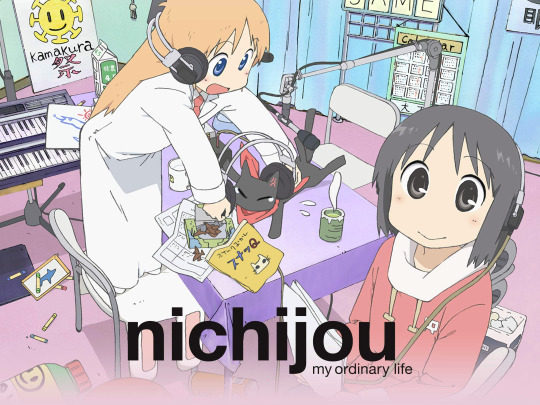
Number of episodes: 26. Language options: dub and subs available. Streaming options: Funimation.
Here we have one of the most acclaimed anime comedies out there, an adaptation of Keiichi Arawi’s surreal sketch comedy manga series, produced by Kyoto Animation, a name that’ll be showing up here again later.
Nichijou mainly focuses on two different trios of characters. There’s the ordinary high school girls Yuuko Aioi, a rather dim and reckless girl with terrible luck, Mio Naganohara, the most relatively normal one of the cast, whenever she’s not having explosive freak outs that involve beating people up, and Mai Minakami, a stoic girl who enjoys messing with people just for their reactions. On the other hand, there’s the far less ordinary Shinonome Laboratories trio of Professor Shinonome, an 8 year old girl who happens to be capable of building incredibly advanced machines, Nano Shinonome, a robot built by the Professor who desperately desires a normal girl more than anything, and Sakamoto, their pet cat who, thanks to a special scarf also made by the Professor, is capable of talking. The series focuses on their would-be ordinary lives, were it not for the seemingly daily chaos they get involved in, from witnessing the school principal wrestle a wild deer, to being trapped in an elevator for hours, to the school science teacher attempting to capture Nano for study. It also follows the antics of several other side characters, such Koujiro Sasahara, the seemingly upper class student who is actually just the son of a family of farmers, to Misato Tachibana, a very typical tsundere towards Sasahara, whose tsun side manifests as assaulting him with military-grade weapons, to little effect, to the equally quirky teachers of their school.
Needless to say, it’s a very silly and chaotic series, and that’s exactly what makes it so memorable. The humor is pretty hit and miss in the first half of the series, but from episode 14 onwards, they thoroughly master it, with every episode having at least a few scenes that got me laughing. Beyond the silliness, though, the series actually has a lot of heart to it. There’s a few moments that change up the status quo, or even develop the characters just a bit, and some scenes are surprisingly sweet, if still played for laughs more often than not. There’s also a lot of continuity, which in later episodes often provide the punchlines to some of the best gags, which definitely encourages watching the whole series. The Japanese voice acting is fittingly crazy for each character, and the animation fits perfectly, as while the character designs are quite simple, there’s many would be mundane moments that have contrasting overly impressive and exaggerated animation that makes them very memorable.
All in all, Nichijou is a very enjoyable series once it finds its groove, and about the only reason its not higher on my rankings is just because pure comedies aren’t really one of my favorite genres. Still, if you ever want a good laugh, you can’t go wrong with this.
3. Soul Eater
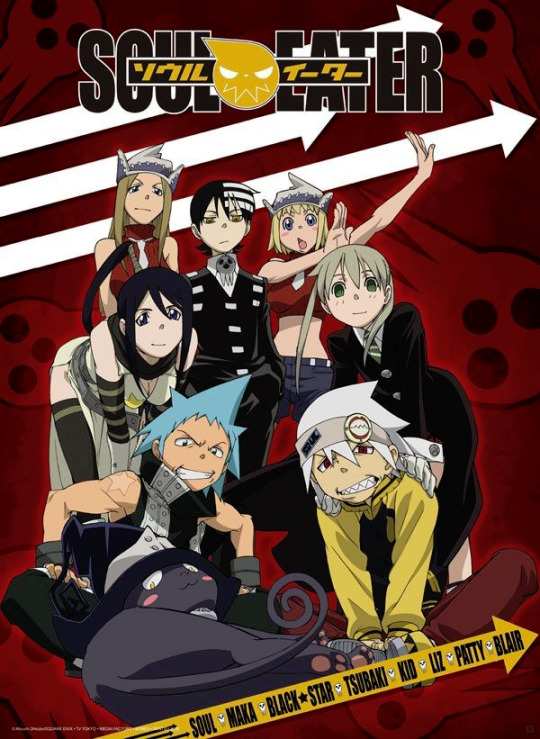
Number of episodes: 51. Language options: dub and subs available. Streaming availability: Netflix, Funimation.
Soul Eater is yet another adaptation, this time of a manga by Atsushi Ōkubo, produced by Studio Bones, who also did the Fullmetal Alchemist animes, and is quite similar to the original FMA series in that it outpaced the manga and, rather than simply overloading itself with filler, decided to go in an entirely different direction by the end.
The Death Weapon Meister Academy is a school founded by Death himself, dedicated to the training of Meisters, who wield Weapons, humans with the ability to shapeshift into weapons, for the purpose of destroying Kishin Eggs, evil beings who have consumed the souls of others, and pose the risk of transforming into extremely dangerous demons. Any Meister who can collect the souls of these corrupted beings, as well as the soul of a Witch, can transform their Weapon into a Death Scythe, the personal arms of Death. Among the students of the DWMA are seven Meisters and Weapons who stand out in particular: the teams of Maka Albarn, a kind hearted and responsible, though temperamental, girl, her Weapon, Soul “Eater” Evans, a laidback and snarky wannabe “cool” guy, Black Star, a prideful and loudmouthed ninja who’s seemingly always out to make a spectacle of himself, regardless of how it hampers him, his Weapon, Tsubaki, a humble and levelheaded woman, Death the Kid, the son of Death and one of the top students in the cool, held back only by a crippling obsession with symmetry, and his Weapons, Liz and Patty Thompson. While these seven gradually come together as a team, a Witch named Medusa begins to put an ambitious and destructive plan into motion, one involving her “child”, Crona, and the strange, insanity inducing black blood that courses through their veins.
Soul Eater has a lot going for it. A likeable and crazy cast of characters, even the side ones, like the maniacal Doctor Stein, or the surprisingly goofy and casual Death, or the tragic Crona, or the hilariously egotistical Excalibur, to a lot of fun action scenes, to its great animation and overall unique visual design, including the sun and moon having giant, creepy laughing faces. It has a lighthearted, comedic tone that doesn’t detract from the serious moments, and the main characters get some pretty good development as the series goes on. The dub is also great, with Laura Bailey as Maka, Micah Solusod as Soul, Brittney Karbowski as Black Star, and Todd Haberkorn as Death the Kid especially sticking out to me.
In general, I don’t have a lot of significant criticisms, besides how the story is handled once the villainous organization Arachnophobia is introduced, which is also about where it begins to deviate from the manga. Most of the villains part of it never really feel like a threat, and the story becomes much more simple and typical compared to how the manga went, and when the ending arrives, it just kinda, happens, with several notable subplots just kinda left unfinished. It definitely feels like an underwhelming ending, and is a big reason why I place this lower on the list, but Soul Eater is still a pretty entertaining watch that’s worth a try if you want a decently lengthy, but not horribly long shonen.
2. The Melancholy of Haruhi Suzumiya
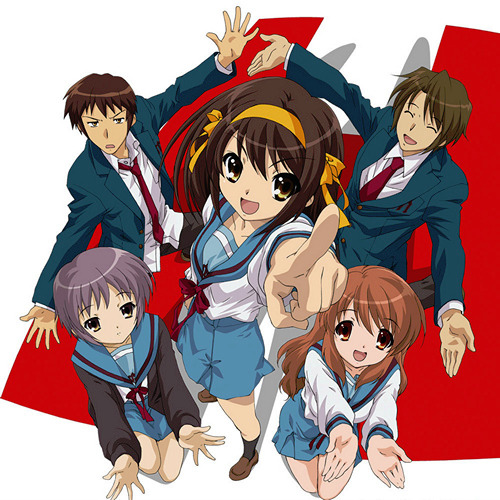
Number of episodes: 28. Language options: dub and subs available. Streaming availability: Funimation.
Here we have the big one, an extremely memetic and famous series by Kyoto Animation, based on a series of light novels by Nagaru Tanigawa, a series that was finally completed back in November 2020 after its start in 2003.
Kyon is a lazy and down to earth high school student who wishes for little more for himself than an uneventful, normal high school life- a hope that’s abruptly shattered when, on a whim, he becomes involved with Haruhi Suzumiya, an eccentric, hyperactive, and thoroughly self centered girl, who claims to have no interest in ordinary humans, and instead wishes to discover things thoroughly unusual, such as aliens, time travelers, or espers, and forces Kyon to form a club, the SOS Brigade, with her to achieve this. Haruhi quickly pulls three other students into the brigade, those being Yuki Nagato, a stoic and quiet bookworm, Mikuru Asahina, a shy and passive girl often subjected to humiliation and abuse by Haruhi, and Itsuki Koizumi, a calm transfer student who acts extremely subservient to Haruhi. While Kyon initially writes off the club as an unreasonable use of his time, his fellow members reveal an unexpected truth to him: the subjects of Haruhi’s fascinations actually do exist. Yuki is an alien, of a sort, created and controlled by an entity known as the Data Overmind, Mikuru is a time traveler from some point in the future, and Itsuki is an esper, and member of an organization of similar people. All three of them have been sent to observe the oblivious Haruhi, who appears to have the unconscious ability to change reality itself according to her desires, and is at threat of remaking the entire world if not placated. With Haruhi apparently having taken a unique interest in Kyon, he finds himself taken along for all sorts of supernatural adventures spawned from Haruhi’s whims.
There’s a lot I could go on about regarding Haruhi, but in the interest of not turning this into a full on rant, I’ll keep shortish. It’s more or less an insane mishmash of several different genres, from slice of life, to science fiction, to fantasy, just depending on what each individual story feels like being. The episodes are mostly adapted from the early light novels, mostly the multiple stories from the third and fifth novels, The Boredom and The Rampage of Haruhi Suzumiya, respectively. It’s not often you’ll have any idea just what to expect from each individual episode, which makes the series very chaotic, but interesting. The characters are likeable and memorable, including the side characters, and the sheer ridiculousness of what goes on makes for many amusing moments. At the same time, the series is surprisingly complex, with many possible interpretations of its characters and the events they go through, furthered by the antics Kyoto Animation pulled when it was originally airing, such as airing the episodes out of chronological order, meaning the plot would often jump from the middle of an arc to something else. The end result is a very unique and enjoyable product, helped by the fantastic dub, with the actors capturing each character perfectly, from Crispin Freeman as the grounded and snarky Kyon, to Wendee Lee as the aggressively energetic Haruhi, to Stephanie Sheh as the gentle, yet secretive Mikuru.
That said, there is one pretty disappointing part of it all, and that’s the second season, mostly thanks to the infamous Endless Eight arc, an eight part arc that’s more or less the same things happening over and over, with only the first and last episodes having anything noticeably different. Regardless of its own uniqueness, more than half the season is taken over by this, and something that may have worked if cut down to three or four episodes instead singlehandedly killed off the series’ goodwill. About the only redeeming factor of the second season is the five part adaptation of The Sigh of Haruhi Suzumiya, which has some of the funniest moments in the whole series. Overall, Haruhi is still a very fun series, and I’m really gonna have to watch its movie, The Disappearance of Haruhi Suzumiya, one of these days.
1. Trigun

Number of episodes: 26. Language options: dub and subs available. Streaming availability: Funimation, Hulu.
Finishing off this list is an adaptation of a manga series by Yasuhiro Nightow, produced by Madhouse and another adaptation that overtook its source material. Compared to how Soul Eater handled it, however, Trigun went down much, much better, to the point Nightow himself had nothing but praise for how the anime turned out, and the series is generally considered one of the best animes of the late 90′s.
On the harsh desert planet of Gunsmoke lives a wandering gunslinger known as Vash the Stampede, the “Humanoid Typhoon” with a large handgun known to leave tremendous destruction in his wake, who amassed a bounty of $$60,000,000,000 after destroying the city of July, leading to an endless trail of bounty hunters out to collect the price on his head. In the middle of all this, Meryl Stryfe and Milly Thompson, two representatives of an insurance society which is often forced to pay for damages caused by Vash, track him down for the purposes of minimizing the chaos he causes. Upon catching up with him, however, the duo discovers that, contrary to his reputation, Vash is a kindhearted goof, and self proclaimed hunter of love and peace, who absolutely refuses to ever take another person’s life, even at great personal risk to himself. Vash continues his travels carefree, helping out whoever he can, with the occasional assistance of Meryl and Milly, as well as a traveling priest known as Nicholas D. Wolfwood, only to one day have an encounter with a mysterious and cruel man known as Legato Bluesummers. Vash soon learns that Legato has hired a group of assassins known as the Gung-Ho Guns to kill Vash, and leave a trail of bodies wherever they go, seemingly for the sole purpose of tormenting Vash. As Vash hunts down Legato, he is gradually forced to face his past, and consider whether he can truly stay committed to his pacifist ideals.
In general, Trigun is just a very, very well made series. It has a likeable and developed cast of characters, with special mention going to Vash, who is a very compelling and sympathetic character, and Wolfwood, who makes a great foil to Vash with very interesting development of his own, with characters outside of the main cast being memorable as well, from Legato himself, to even some of the more minor villains, such as the varied members of the Gung-Ho Guns, or Brilliant Dynamites Neon, who makes an inexplicably strong impression for a one off villain not even important to the overall plot. The space western setting is quite good, and the designs are great, with many villains having distinctive looks that further help them make an impression. The action is great, and the animation is also quite good, and has that 90′s anime charm. The dub, while a bit rough around the edges, is generally solid too. From Lia Sargent as the ditzy but kind Milly, to Dorothy Elias Fahn as the hotheaded Meryl, to Jeff Nimoy as the weary Wolfwood, to Richard Cansino as the calculating and disturbing Legato, with special mention needing to go to Johnny Yong Bosch as Vash. Despite it actually being his first voice acting role ever, he does a great job in portraying the many sides to Vash, and absolutely sells many of the biggest moments in the story.
Speaking of which, the series started quite lighthearted and wacky, with the first four episodes actually being filler, but gets gradually darker as it goes on. The earlier episodes are still quite enjoyable on their own, though, and manage to slowly reveal new aspects to Vash in each one, before finally setting his nature in stone in episode 5. What really sells the series and makes it so memorable, however, are the themes it explores, of the practicality of unwavering pacifism, and whether taking a life, whether for heinous crimes committed without remorse, or with the purpose of protecting others, is ever justifiable. While quite a few series have touched dilemmas like this before, what makes Trigun stand out with it is the emphasis placed upon it throughout the whole series, with many episodes touching upon it in some regard. It genuinely fairly looks at the different sides of it all, and the consequences of each, with many emotional moments coming from it as a result. While the manga did ultimately take a very different turn from the anime, the anime actually preserves several of the most important plot moments, and manages to come to a satisfactory conclusion of its own regarding the themes. Ultimately, Trigun makes for a very fun and interesting watch that I highly recommend.
And with that, my ranking is complete. With the exception of Robotics;Notes, I can pretty confidently recommend every show on this list. Got some more shows I plan to get through soon, so another ranking like this may be soon in the making. Either way, till next time.
-Scout
#anime#trigun#nichijou#haruhi suzumiya#the melancholy of haruhi suzumiya#soul eater#robotics;notes#long post
39 notes
·
View notes